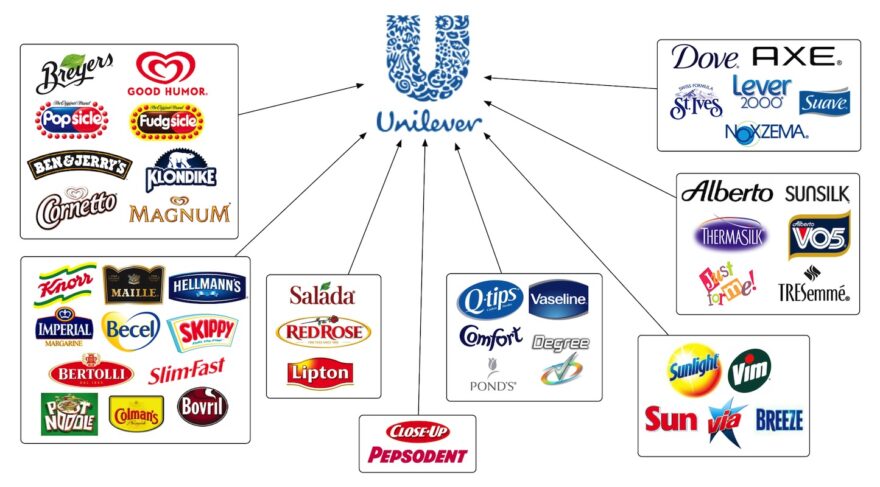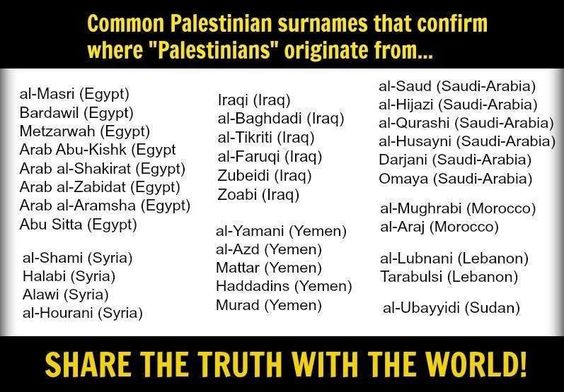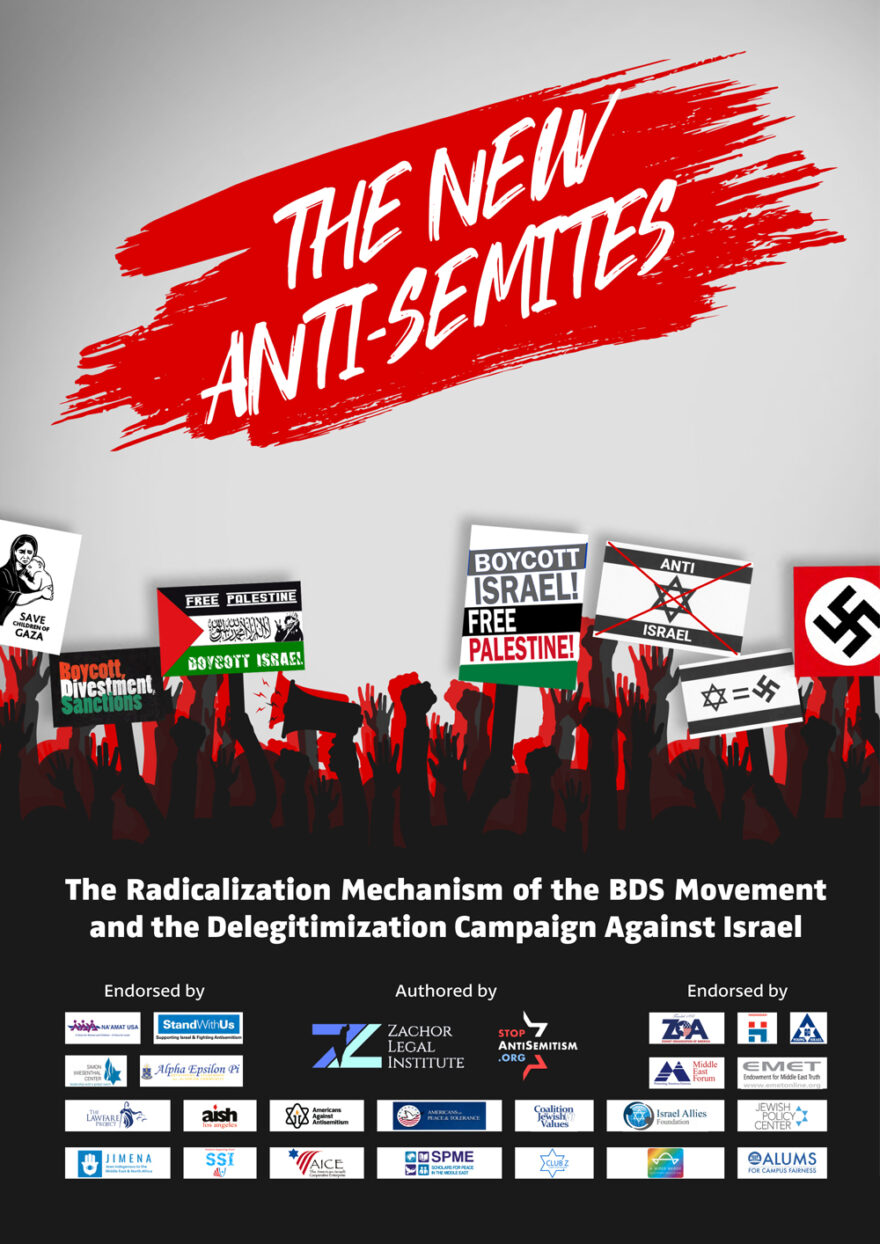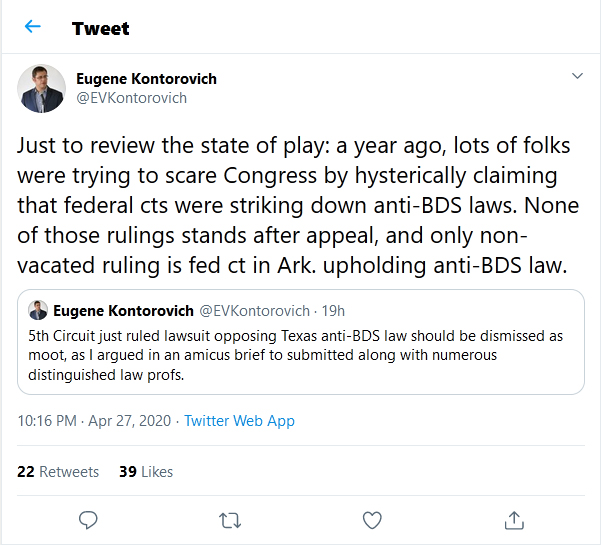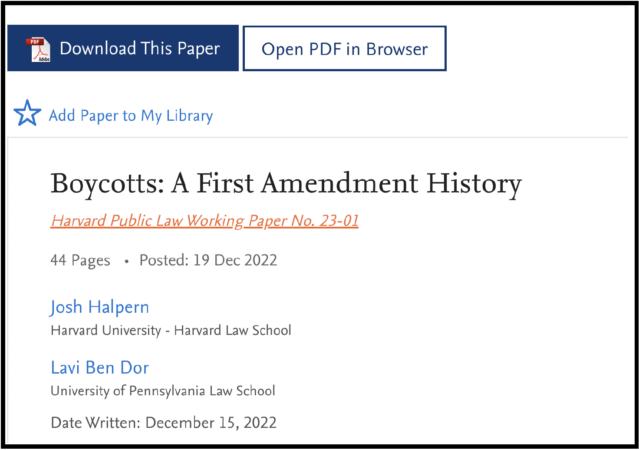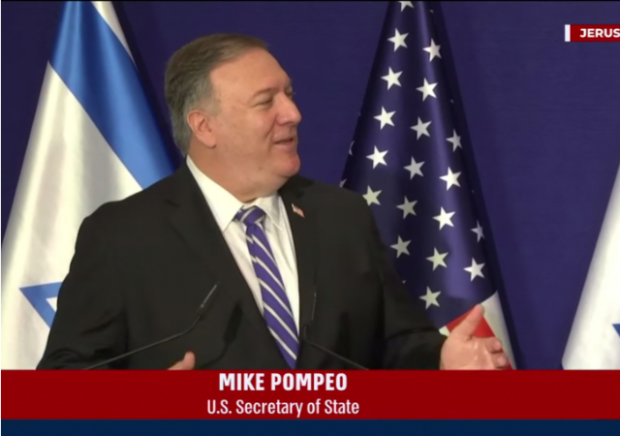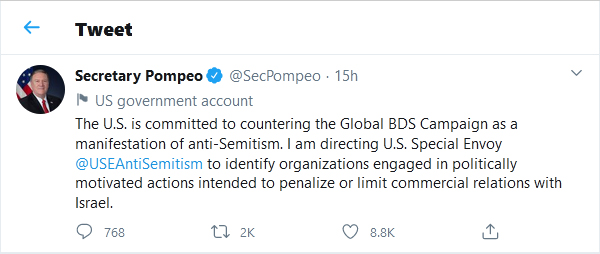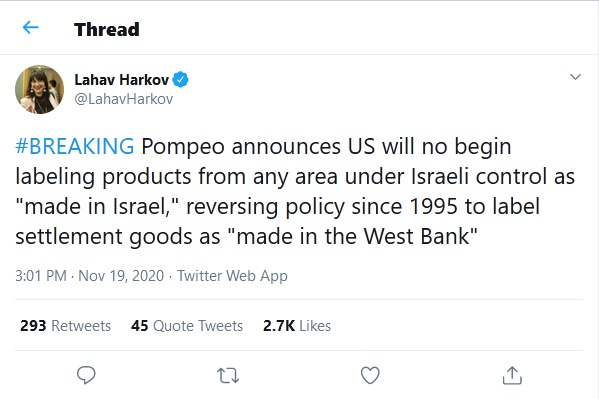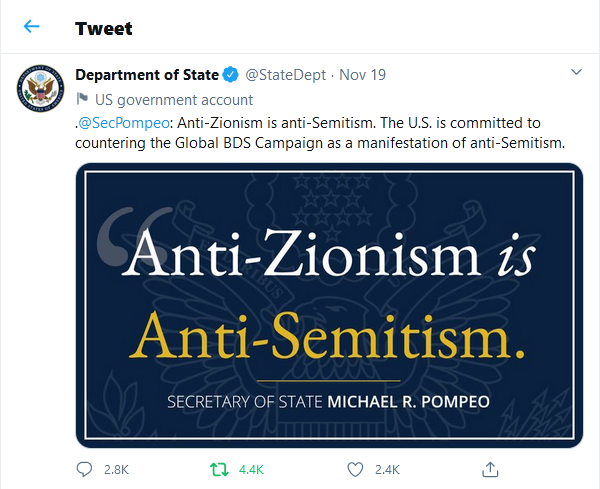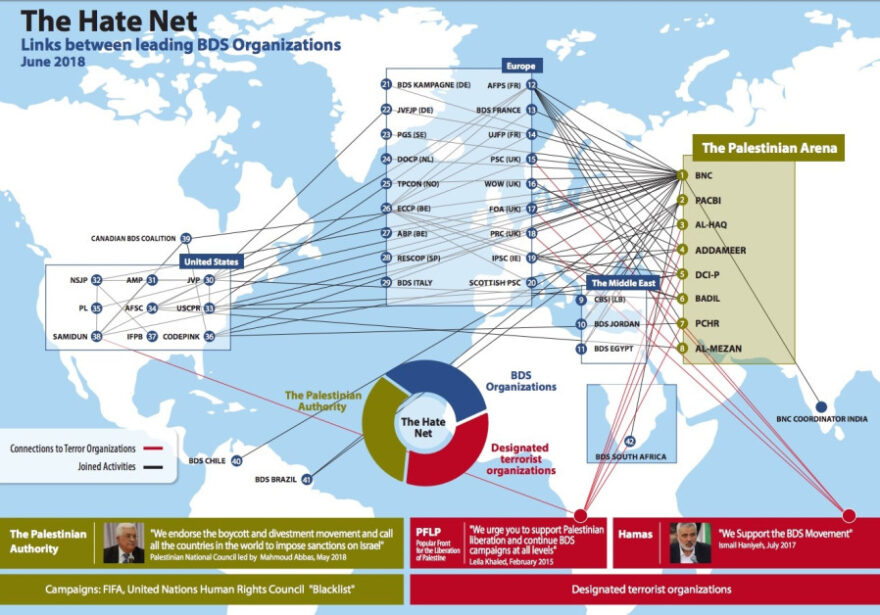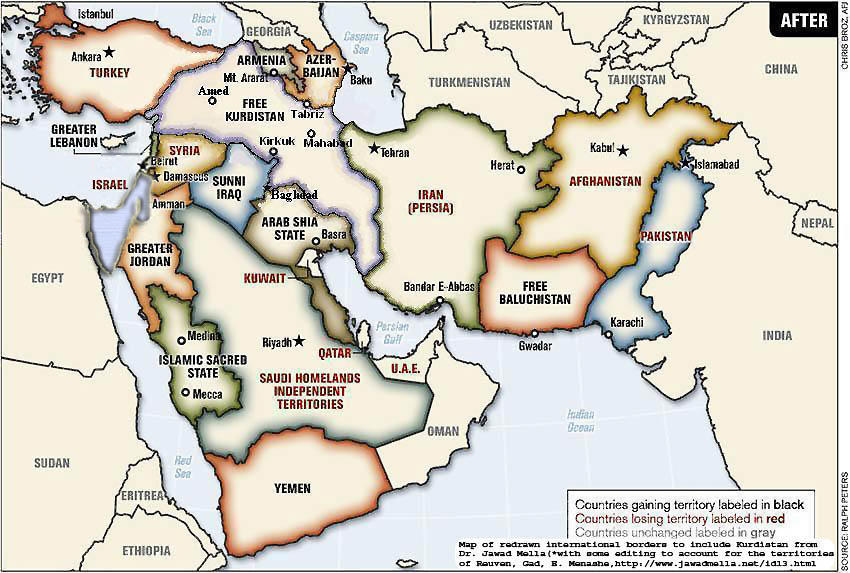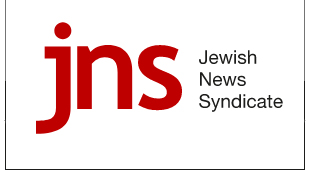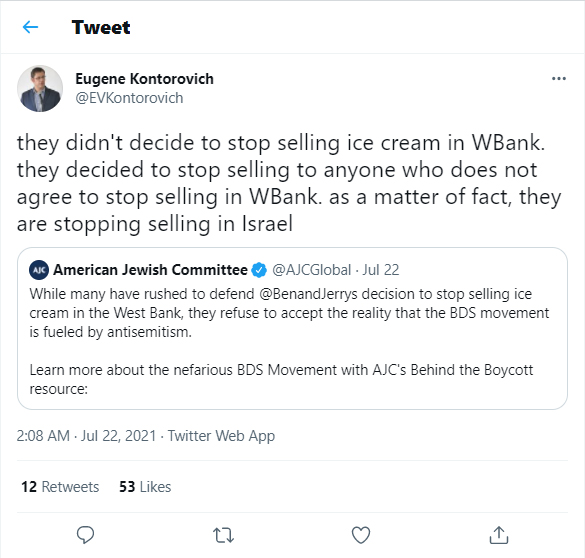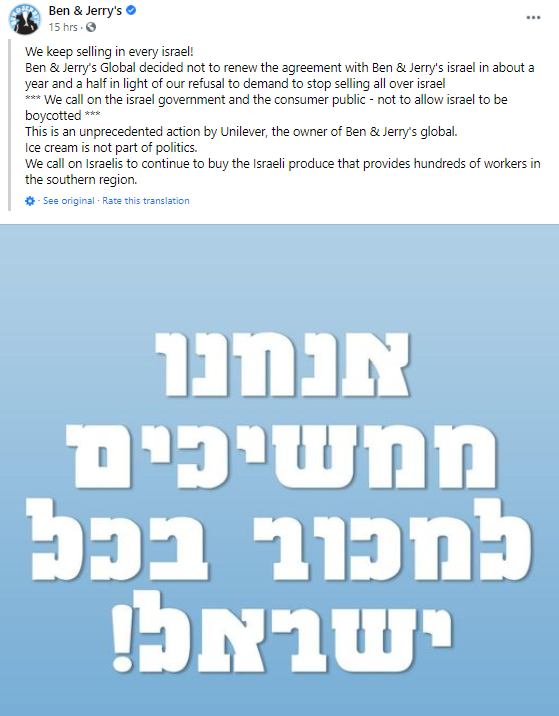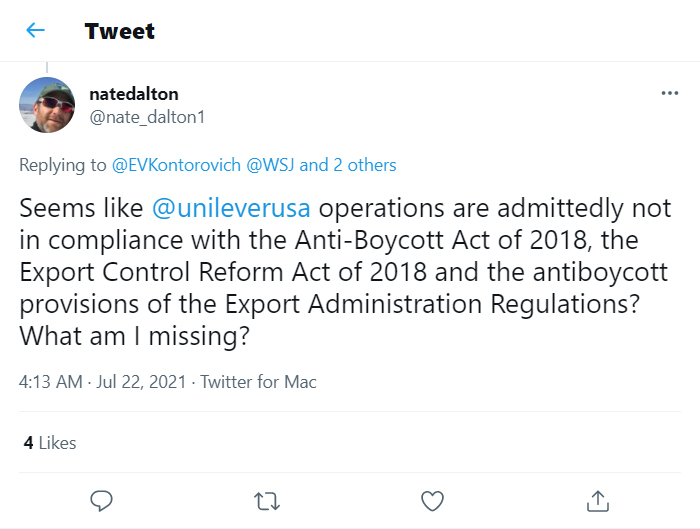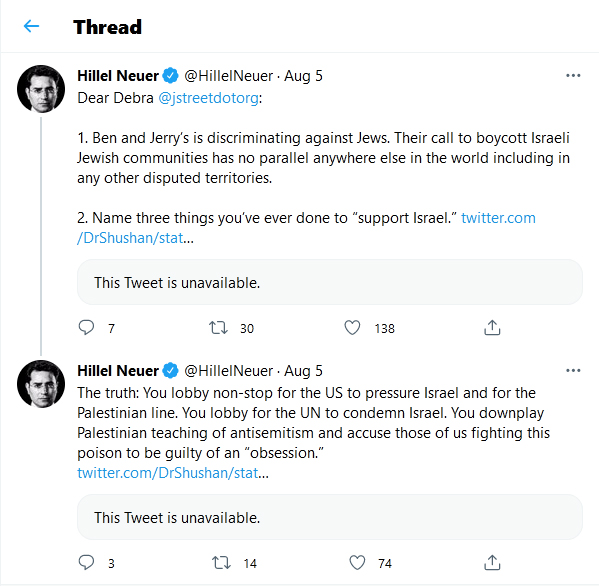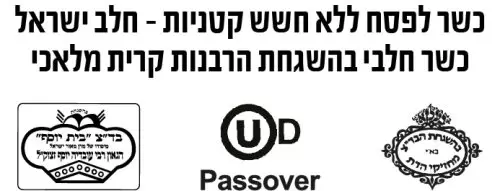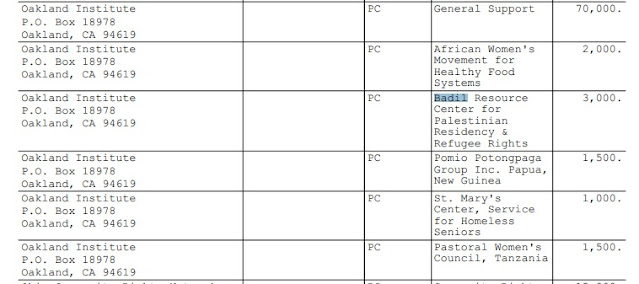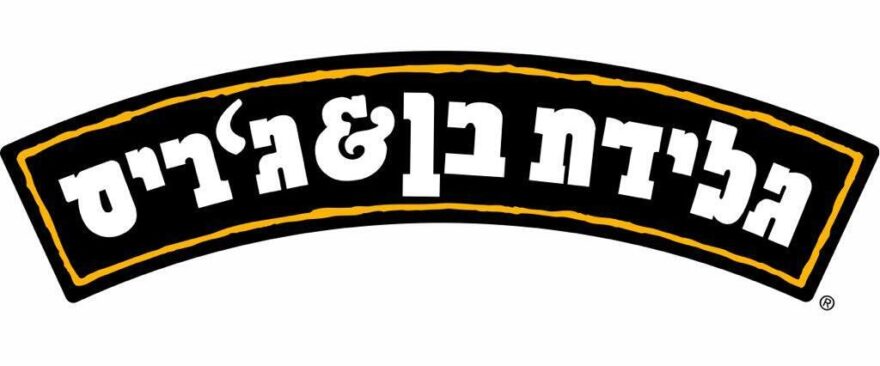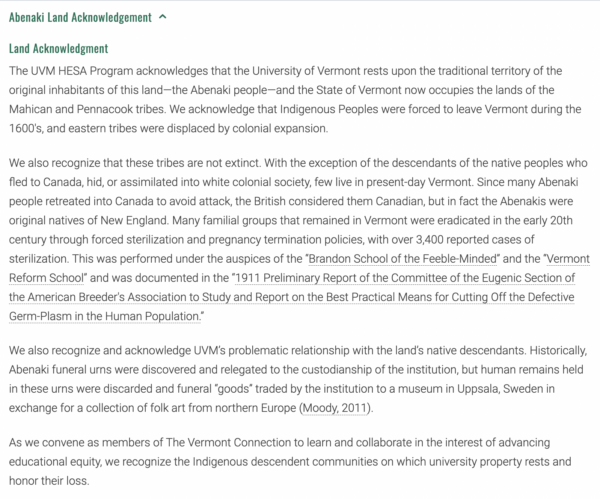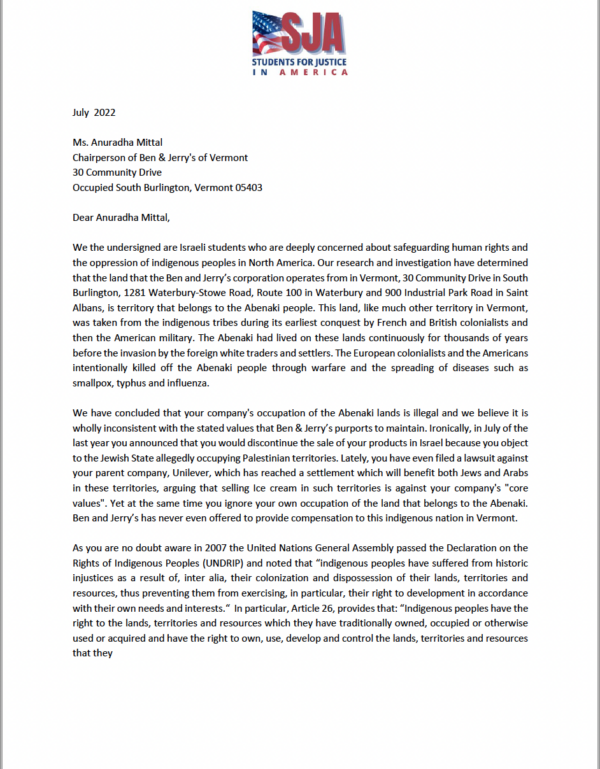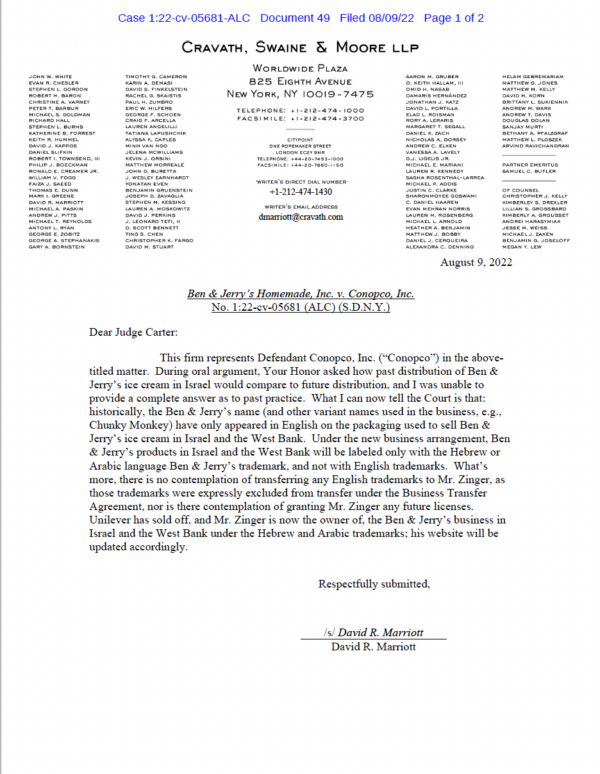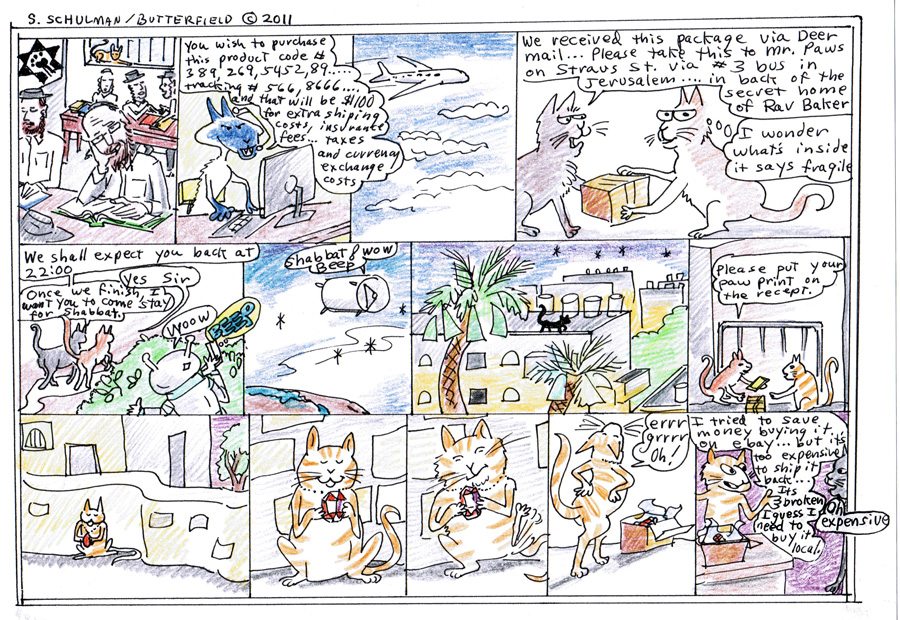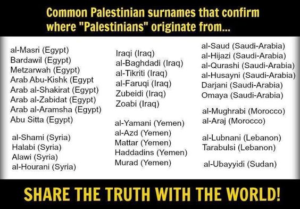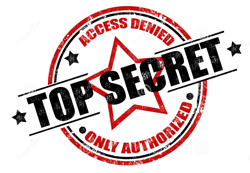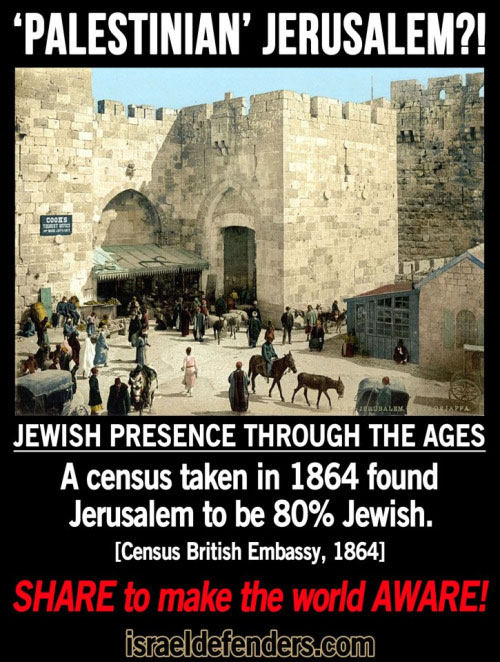Time to Boycott the Boycotters: Boycott Unilever, Ben & Jerry’s parent Corporation.The time to get loud on Ben & Jerry’s and Unilever is now. |
|||
Without an Aggressive Response, Ben & Jerry’s and Unilever Decision Is a Harbinger of Further Divestment From Israel |
|||
|
|||
Launching a counter controversy assault on Ben & Jerry’s and Unilever may or may not make the company back away from supporting BDS, but more importantly, it will signal to the CEOs of the 124 global (non-Israeli) companies actively being pressured by BDS that the controversy doesn’t go away once the company acquiesces to BDS — it only gets worse.Update 29June2022: BDS FAILED! Unilever Sells Ben & Jerry’s Israeli Business To Defuse BDS Row TO LOCAL ISREALI licensee OWNER
Your best option to fight BDS is to Buy locally and save!Don’t give your money to the Globalist Mega Cartels. Give it to the local Farmers and Businessmen and Women. An Example from eBay: Buy locally and save | Local Israel Buying Guide: Grocery Shopping in Israel |
|||
From the Leftist:Dr. Einat Wilf on Zionism – Full Interview |
|||
|
|
||
For Anti-Zionists, ‘Palestine’ Does Not Stop at the Green LineIn the end, when Israel’s enemies speak of the “Occupied Palestinian Territory,” they are not thinking “Gaza and Judea-Samaria.”By Rabbi Dov Fischer Published on 08August2021 https://www.israelhayom.com/opinions/for-anti-zionists-palestine-does-not-stop-at-the-green-line/ In the aftermath of the recent uproar over the Ben & Jerry’s ice cream company announcing it would boycott the “Occupied Palestinian Territory,” it is worthwhile to look closer at that term: “Occupied Palestinian Territory.” In 1964, Ahmad el-Shukairy convened a conference at which he created a terror movement called the “Palestine Liberation Organization.” The PLO undertook to perpetrate terror acts against civilians to “liberate Palestine from the Israelis.” At the time Jordan occupied Judea and Samaria (the “West Bank”), and Egypt occupied Gaza. Yet, none of the PLO’s terror campaign was aimed at driving Jordan or Egypt out of those illegally occupied lands. Rather, to liberate the newly fabricated “Palestine,” all PLO terror aimed instead at driving the Jews out of Tel Aviv, Haifa, Ra’anana, and other cities, towns, and villages in pre-1967 Israel and “into the [Mediterranean] sea.”
It always has been Arab Muslim Orthodoxy that “Palestine” actually is the entire country of Israel, not merely Judea and Samaria. Just contemplate the emblems of the “Palestine” terror groups, including the PLO, Fatah, Hamas, and the Palestinian Islamic Jihad (PIJ). That is their “Occupied Palestine Territory” – not the “West Bank” nor Gaza but all of Israel. It is as clear as day — on their flags and banners. It is their logo. There is no need to gain fluency in Arabic to grasp what is on their minds and in their attack plans. To the degree they claim they want “back” their “Palestine territory” from which they claim they were “expelled,” anti-Zionists’ demands would not be resolved by telling Arabs who claim their families once lived in Akko (Acre) or Yafo (Jaffa) that, in satisfaction of their aspirations, they now may have Jenin in Samaria or Beit Hanoun in Gaza. People claiming Akko or Yafo lineage do not want Gaza. It’s like a real estate agent telling a Chicago-based Midwestern American Jew seeking to relocate to the Brooklyn, NY of his childhood: “I know you have a cultural longing for Brooklyn, the sights of Flatbush, old Ebbets Field where the baseball Dodgers played, Boro Park and Crown Heights, and Irv’s Knishery of Canarsie. Unfortunately, I cannot offer you that, but here is something that is basically identical: I have a listing in Chubbuck, Idaho and another in Waterloo, Iowa. Believe me, you won’t know the difference.” Of course, the difference is palpable. Likewise, with supposed “millions of Palestinians” demanding a “right of return,” Gaza and the “West Bank” never will address the demands for “Occupied Palestinian territory.” In the end, when Israel’s enemies speak of the “Occupied Palestinian Territory,” they are not thinking “Gaza and Judea-Samaria.” Rather, their slogan is “From the River to the Sea, Palestine will be free.” This map shows what lies between that Jordan River and Mediterranean Sea: the entirety of the country of Israel. How else to understand why so many “Palestinians” living in Gaza ruled by Hamas and in the “West Bank” Palestine Authority ruled by Abu Mazen (Mahmoud Abbas) live in “Palestinian refugee camps”? If those Arab Muslims truly are a “Palestinian” nation, and if “Palestine” and the “Occupied Palestinian Territories” truly are the regions of Gaza, Judea, and Samaria – then why and how can those Arabs who have been living there for decades call themselves “refugees” and demand – and receive – billions in international handouts from the United Nations, the European Union, and even the United States through agencies like the UNRWA as though living displaced from their own land? Who heard of “refugees” residing in their own land? Rafah Refugee Camp has 125,000 residents in Gaza. Khan Yunis Refugee Camp has another 87,816 there. Nuseirat Refugee Camp has another 80,000 there. Balata Refugee Camp has 27,000 in the “West Bank.” Shu’fat Refugee Camp has 24,000 there. Askar Refugee Camp has 18,500 there. In all, the Gaza Strip has eight official refugee camps and 1,221,110 registered refugees. The “West Bank” has 19 official and four unofficial refugee camps, and 741,409 registered refugees. That makes two million “Palestinian refugees” in “Palestinian refugee camps” all living under “Palestinian” sovereignty in supposed “Palestine,” with Hamas sovereign in Gaza and Abbas’s Fatah reigning in the “West Bank” Palestine Authority. For those who speak of a “Two-State Solution,” as though Israel’s enemies will be prepared to live alongside her in peace someday if only Israel withdraws from Judea and Samaria, it is important occasionally to glance back at Arab terror logos. If “one picture is worth a thousand words,” six pictures of Palestinian terror logo banners are worth 6,000 Hamas rockets and missiles aimed at Jewish civilian population centers and Israel’s survival. |
|||
Israel’s Ministry of Strategic Affairs and Public Diplomacy (MSA) today released its “Terrorists in Suits” report, which reveals over a whopping 100 links shared between the internationally-designated terrorist organizations Hamas and the Popular Front for the Liberation of Palestine (PFLP) and at least 13 anti-Israel BDS promoting NGOs.
Israel’s Ministry of Strategic Affairs has released a report exposing the antisemitic agenda being the Boycott, Divestment, and Sanctions movement (BDS). “BDS is an anti-Semitic campaign led by supporters of terror with one purpose: the elimination of the Jewish state.” |
|||
BDS Leader Shredded by Missouri State RepresentativesNGO-Terror Links Case Study: EU Funding to UAWC in 2011-2017NGO Monitor June 08, 2020 https://www.ngo-monitor.org/ngo-terror-links-case-study-eu-funding-to-uawc-in-2011-2017/ OverviewIn 2011-2017, the EU provided €18.3 million to projects involving Union of Agricultural Work Committees (UAWC), a non-governmental organization (NGO) linked to the Popular Front for the Liberation of Palestine (PFLP).1 It appears that €12.1 million went to projects where UAWC was the only implementer. Two UAWC employees, who worked with the organization’s finances, were arrested in 2019 and are currently standing trial for being part of a PFLP terror cell that perpetrated the August 2019 murder of a 17-year-old Israeli.
Footnotes
|
|||
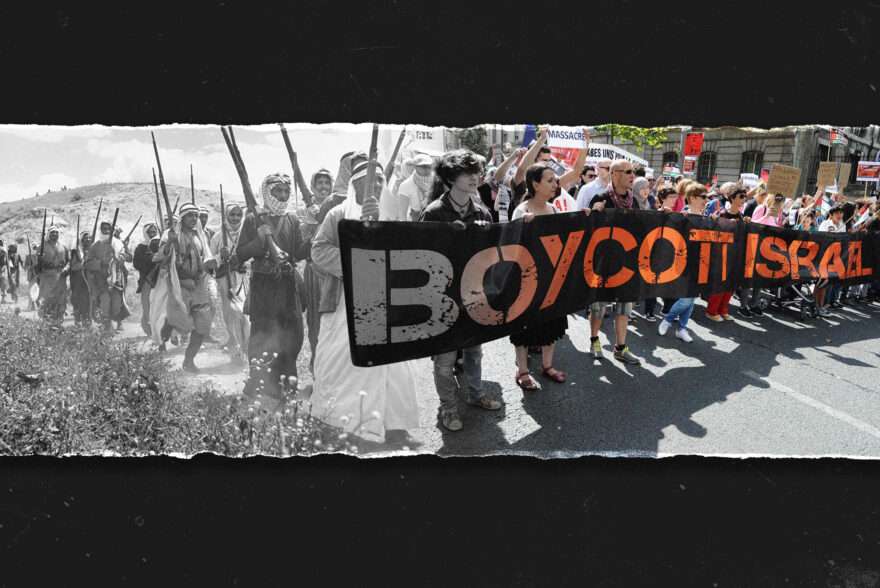 War by Other Means A History of Anti-Israel Boycotts, From the Arab League to BDS David May Research Analyst War by Other MeansA History of Anti-Israel Boycotts, From the Arab League to BDSDavid May Research Analyst 20January2020 https://www.fdd.org/analysis/2020/1/20/war-by-other-means The Boycott, Divestment, and Sanctions campaign, or BDS, is the most recent iteration of a century-old effort to attack the legitimacy and economic viability of the Jewish state and its precursors. Arabs initiated boycotts of Jewish businesses in the Holy Land in the early 20th century, with the goal of preventing the establishment of a Jewish state. The Arab League declared a comprehensive boycott in 1945, first to reinforce these efforts, then to reverse the outcome of Israel’s War of Independence. In other words, these countries sought the annihilation of the Jewish state. In pursuit of its boycott, the Arab League sought to leverage the disparity between the size and wealth of its members’ oil-rich markets and the diminutive Israeli economy. The former represented a tantalizing prospect for companies large and small. To access them, however, the Arab League insisted that companies not trade with Israel or even with other companies that did. The boycott forced numerous major corporations to avoid or cut ties with the Jewish state. American anti-boycott measures and inconsistent enforcement by Arab League member states convinced many companies to reject the boycott. The Arab League boycott lost further steam during the Palestinian-Israeli peace process in the 1990s, which saw the Palestinian Authority officially accept economic relations with Israel. When the peace process unraveled, however, non-governmental organizations (NGOs) revived the boycott. Western activists and NGOs helped develop the campaign’s infrastructure, including the July 2005 “Call for Boycott, Divestment, and Sanctions Against Israel,” from which the campaign takes its name. BDS has borrowed heavily from the anti-apartheid campaign that brought down the South African regime in the 1990s. The attempt to conflate Israel and apartheid South Africa is libelous and disingenuous, as Israel grants equal rights to all its citizens, Arab and Jewish alike. Nevertheless, BDS has found receptive audiences on college campuses and among certain NGOs and church groups. While BDS pressure campaigns have convinced some sizable firms to break off relations with Israel or cancel significant projects, Israel’s emergence as a global technology leader has frustrated the campaign. Israel enjoys significant investment by major multinationals, such as Google, IBM, and Intel. In macroeconomic terms, Israel continues to grow at an impressive rate, while inflation remains low. With its per capita income approaching that of Italy and South Korea, Israel has cemented its place in the top tier of global economies. The BDS Movement |
|||

Yes, BDS is a terrorist groupPresident Herzog was right to call BDS a terrorist’ organization. After all, it seeks to exclude Jewish or Zionist voices from the non-Israeli space by any means necessary. Yet for some reason, in Israel, the issue has been downplayed.By Prof. Udi Lebel Published on 25July2021 https://www.israelhayom.com/opinions/herzog-was-right-to-call-bds-a-terrorist-group/ There is nothing more significant than President Isaac Herzog’s defining the boycott, divestment, and sanctions movement as terrorism. Israeli politicians and leaders have yet to do this, yet there is no more precise and fitting term for BDS. This is a leadership step of the first degree that we must hope becomes policy that sees our ongoing, serious, and unwavering demand European countries, the US, and the UN categorize this movement as a global terrorist organization. This is not about semantics, and it’s a shame the State of Israel needed an ice-cream crisis in the summer to be reminded of the existence and effectiveness of the BDS campaign. One need only visit a European, Canadian, or American college campus during Israeli Apartheid Week to see why to understand that, to put it mildly, you wouldn’t want to make your Jewishness overly obvious to others. If there is one challenge Herzog can tackle head-on, in direct continuation of his previous role as Jewish Agency chief, it is to make Israelis aware of this shocking terrorism. For some reason, here in the Jewish state, the issue has been downplayed. It’s not spoken about or taught. Television studios don’t bring in Jewish or Israeli students studying overseas to share their stories. In Israel, there is complete ignorance of the issue. The utter silence in response to a number of lecturers from Haifa University, Bar-Ilan University, and the Ben-Gurion University of the Negev calling on Berlin not to recognize the BDS movement as antisemitism is absolutely stunning. Through their letter, these lecturers not only lent a hand to antisemitism, but they also lent a letter to violence, meaning actual terrorism, against Jews, Israelis, and their supporters in Germany. Those unfamiliar with the overseas campus experience could be forgiven for being naïve enough to think this was just another show of support for an ideological movement that sends letters to the editor of Haaretz and The New York Times. This simply isn’t the case. The amazing thing is that this movement does not conceal its objectives or actions: It is a movement that opposes Israel’s existence within any borders, whose supporters wave signs with Nazi symbols, and promotes conspiracy theories on every issue on the agenda, accusing Israel of anything and everything from the September 11 attacks to the outbreak of the coronavirus pandemic. On campuses, BDS terrorizes any lecturer who merely contemplates teaching a course that offers a balanced view of the Israeli-Palestinian conflict. Not only will doing so put any future promotions at risk but their physical safety and ability to get through a seminar will also be threatened, ultimately leading to their firing. The BDS movement seeks to remove the Jewish or Zionist voice from the non-Israeli space by any means necessary, regardless of whether that requires connecting to radical leftist or radical right-wing cells. In Israel, BDS proponents support the movement either in excessive good or bad faith. We must hope Herzog’s much-needed call leads to greater coverage of the BDS movement’s activities. |
|||

The IHRA Working Definition of Antisemitismhttps://www.holocaustremembrance.com/resources/working-definitions-charters/working-definition-antisemitism About the IHRA non-legally binding working definition of antisemitismThe IHRA is the only intergovernmental organization mandated to focus solely on Holocaust-related issues, so with evidence that the scourge of antisemitism is once again on the rise, we resolved to take a leading role in combatting it. IHRA experts determined that in order to begin to address the problem of antisemitism, there must be clarity about what antisemitism is. The IHRA’s Committee on Antisemitism and Holocaust Denial worked to build international consensus around a non-legally binding working definition of antisemitism, which was subsequently adopted by the Plenary. By doing so, the IHRA set an example of responsible conduct for other international fora and provided an important tool with practical applicability for its Member Countries. This is just one illustration of how the IHRA has equipped policymakers to address this rise in hate and discrimination at their national level. The working definition of antisemitismIn the spirit of the Stockholm Declaration that states: “With humanity still scarred by …antisemitism and xenophobia the international community shares a solemn responsibility to fight those evils” the committee on Antisemitism and Holocaust Denial called the IHRA Plenary in Budapest 2015 to adopt the following working definition of antisemitism. On 26 May 2016, the Plenary in Bucharest decided to: Adopt the following non-legally binding working definition of antisemitism: “Antisemitism is a certain perception of Jews, which may be expressed as hatred toward Jews. Rhetorical and physical manifestations of antisemitism are directed toward Jewish or non-Jewish individuals and/or their property, toward Jewish community institutions and religious facilities.” To guide IHRA in its work, the following examples may serve as illustrations: Manifestations might include the targeting of the state of Israel, conceived as a Jewish collectivity. However, criticism of Israel similar to that leveled against any other country cannot be regarded as antisemitic. Antisemitism frequently charges Jews with conspiring to harm humanity, and it is often used to blame Jews for “why things go wrong.” It is expressed in speech, writing, visual forms and action, and employs sinister stereotypes and negative character traits. Contemporary examples of antisemitism in public life, the media, schools, the workplace, and in the religious sphere could, taking into account the overall context, include, but are not limited to:
Antisemitic acts are criminal when they are so defined by law (for example, denial of the Holocaust or distribution of antisemitic materials in some countries). Criminal acts are antisemitic when the targets of attacks, whether they are people or property – such as buildings, schools, places of worship and cemeteries – are selected because they are, or are perceived to be, Jewish or linked to Jews. Antisemitic discrimination is the denial to Jews of opportunities or services available to others and is illegal in many countries. Information on adoption and endorsementNational levelThe following UN member states have adopted or endorsed the IHRA working definition of antisemitism. Beyond the countries listed below, a wide range of other political entities, including a large number of regional/state and local governments, have done so as well. Albania (22 October 2020) Argentina (4 June 2020) Austria (25 April 2017) Belgium (14 December 2018) Bulgaria (18 October 2017) Canada (27 June 2019) Cyprus (18 December 2019) Czech Republic (25 January 2019) France (3 December 2019) Germany (20 September 2017) Greece (8 November 2019) Guatemala (27 January 2021) Hungary (18 February 2019) Israel (22 January 2017) Italy (17 January 2020) Lithuania (24 January 2018) Luxembourg (10 July 2019) Moldova (18 January 2019) Netherlands (27 November 2018) North Macedonia (6 March 2018) Romania (25 May 2017) Serbia (26 February 2020) Slovakia (28 November 2018) Slovenia (20 December 2018) Spain (22 July 2020) Sweden (21 January 2020) United Kingdom (12 December 2016) United States (11 December 2019) Uruguay (27 January 2020) OrganizationsThe following international organizations have expressed support for the working definition of antisemitism: United Nations
European Union Organization of American States Council of Europe |
|||
This is what Israel had before the leftist Peace Plans |
|||
Israel and land re-liberated in the 1967 Six Day War |
Our Historic Homeland Land under King David |
||
The Arabs and their Leftist Supporters need to grow up, get a life and think of the bigger picture of the Middle East. Forget about the past and think of your future. Unless your future is Death like Hamas. The Jews of Israel need to develop the land of Israel and forget about the Arabs. The Arabs Claim Nakba, the Jews that were expelled from Islamic countries have the same claims against the Islamic Countries.Why Are There Still Palestinian Refugees?If you think there are Palestinian people look at their roots, their surname or family name. |
|||
UNRWA’s Anti-Semitic Teachers Exposed in 130-Page UN Watch Report‘Unprecedented’ UN report on anti-SermitismLandmark UN report details right-wing, left-wing, and Islamic anti-Semitism. The United Nations released an interim report of the Special Rapporteur on freedom of religion or belief on the “Combatting anti-Semitism to Eliminate Discrimination and Intolerance Based on Religion or Belief.” This report to the Human Rights Council follows recent addresses by UN Secretary-General Antonio Guterres on anti-Semitism and religious freedom. The report summarizes that anti-Semitic violence, discrimination, and expressions of hostility are “serious obstacles to the enjoyment of the right to freedom of religion or belief,” and the “frequency of antisemitic incidents appears to be increasing in magnitude” as does the “prevalence of anti-Semitic attitudes and the risk of violence against Jewish individuals and sites ” is significant. If left unchecked by governments, anti-Semitism “poses risks not only to Jews, but also to members of other minority communities.” The report has a number of key findings, including the rise of anti-Semitism from three main sources: “growing use of antisemitic tropes by white supremacists including neo-Nazis and members of radical Islamist groups”; increase in “‘left-wing’ antisemitism [that] employ anti-Semitic narratives or tropes in the course of expressing anger at policies or practices of the Government of Israel”; and “notes claims that the objectives, activities and effects of the Boycott Divestement Sanctions (BDS) movement are fundamentally anti-Semitic.” The report notes that in the US in 2017, 58 percent (1,749) of religiously-motivated bias “were driven by anti-Semitic bias.”Governments also enact laws and policies that restrict Jewish practice, including limiting kosher slaughter methods or barring Jews from political participation in higher office. The report identifies steps that government, civil society organizations, and the media can take to limit expressions of anti-Semitism. These include using the “Working Definition of Anti-Semitism” that the International Holocaust Remembrance Alliance drafted in 2016, investing in education and training, and requiring governments to acknowledge that “anti-Semitism poses a threat to stability and security, and that antisemitic incidents require prompt, unequivocal responses from leaders,” with party leaders “promptly, clearly, and consistently reject[ing] manifestations of anti-Semitism within their parties and in the public discourse.” In response to the report, Israel’s ambassador to the UN, Danny Danon, commented that “we welcome the release of this unprecedented report on the subject of anti-Semitism. The report reflects the organizational change towards Israel. The assertion that the BDS movement encourages anti-Semitism is an important UN statement. As I have said many times, anti-Semitism has no place in our society, and must be denounced everywhere and from every platform.” |
|||
What Starts Online, Doesn’t Stay There |
|||
New Damning Report Exposes the Dangerous Connection Between BDS Movement and Jew HatredBy David Lange 17December2019 https://www.israellycool.com/2019/12/17/new-damning-report-exposes-the-dangerous-connection-between-bds-movement-and-jew-hatred/
|
|||
Rabbi Sacks on The Mutation of Antisemitism |
|||
NO Pro-BDS rulings stands after appeal
Judge dismisses lawsuit against Arkansas’ anti-BDS lawFederal judge lets Arkansas law requiring state contractors to pledge not to boycott Israel stand.Elad Benari , 25January2019 https://www.israelnationalnews.com/News/News.aspx/258130 A federal US judge has let stand an Arkansas law requiring state contractors to pledge not to boycott Israel, ruling that such a boycott is not protected by the First Amendment, The Associated Press reports. The ruling was handed down on Wednesday by US District Judge Brian Miller, who dismissed the lawsuit the Arkansas Times had filed challenging the 2017 law. The newspaper had asked the judge to block the law, which requires contractors with the state to reduce their fees by 20 percent if they don’t sign the pledge. The Times’ lawsuit said the University of Arkansas Pulaski Technical College refused to contract for advertising with the newspaper unless the newspaper signed the pledge. The paper isn’t engaged in a boycott against Israel, according to AP. Miller wrote on his ruling that refusing to purchase items isn’t protected speech. He noted that the Times wouldn’t be barred from other protected forms of speech, including writing or picketing against Israel policies. “It may even call upon others to boycott Israel, write in support of such boycotts, and engage in picketing and pamphleteering to that effect. This does not mean, however, that its decision to refuse to deal, or to refrain from purchasing certain goods, is protected by the First Amendment,” wrote the judge. Arkansas is one of a host of US states that have approved legislation against the anti-Israel Boycott, Divestment and Sanctions (BDS) movement. In addition to Arkansas, states that have approved anti-BDS legislation include: New York, California, New Jersey, Indiana, Florida, Tennessee, Arizona, Michigan, Montana, Kansas, Texas and Virginia. The anti-BDS laws have been challenged in other states as well. Last year, a federal judge temporarily blocked the anti-BDS law in Kansas following a lawsuit by the American Civil Liberties Union. In September of 2018, a federal judge blocked Arizona from enforcing a similar measure. Anti-BDS legislation has also been challenged in Texas, where a speech pathologist sued the local public school district in December, after she was let go for refusing to sign an agreement that she “does not” and “will not” engage in a boycott of Israel, |
|||

Arkansas ‘Anti-BDS’ Statute To Remain, SCOTUS Refuses To Hear ChallengeRefused to hear an appeal from an Eighth Circuit ruling upholding the law, the only circuit-level court to have addressed the merits of the anti-Israel-boycott statutes.Posted by Jane Coleman, February 21, 2023 at 10:04am https://legalinsurrection.com/2023/02/arkansas-anti-bds-statute-to-remain-scotus-refuses-to-hear-challenge/ This morning, the United States Supreme Court denied the petitioner’s application for writ of certiorari in Arkansas Times v. Waldrip, leaving intact an Eighth Circuit en banc ruling upholding Arkansas’ “anti-BDS” (boycott, divest, and sanction) statute. The decision marks a major win in the battle against challenges to these laws prohibiting taxpayer-funded discrimination against the Jewish state. We covered the case and its procedural history here:
The Arkansas law, passed in 2017, requires companies that enter into public contracts to certify that they do not and will not boycott Israel. From the Eighth Circuit opinion:
As we wrote here, The Arkansas Times, represented by the American Civil Liberties Union (ACLU), originally challenged the statute in district court, arguing that it violates the First Amendment. The court dismissed the suit, holding that the anti-Israel boycotts are not protected by the First Amendment because they are neither speech nor expressive conduct. That decision was then reversed by a divided three-judge panel of the Eighth Circuit Court of Appeals. The Eighth Circuit subsequently granted a rehearing en banc, i.e., with all of its active judges presiding. The lawsuit was the latest in the ACLU’s years-long battle against anti-BDS laws—a battle roundly criticized for its hypocrisy. Historically, the ACLU championed antiboycott legislation that protected gays and lesbians, law professor Eugene Kontorovich observed in a 2019 Wall Street Journal op-ed. But when the Jewish state appeared in the crosshairs of the modern-day BDS movement, the civil liberties group gained a strange new respect for boycotts: “Now,” he wrote, “it is prepared to risk legal protections for sexual minorities for the sake of creating a constitutional right to boycott Jews.” In the Arkansas Times case, the ACLU claimed that the Arkansas statute placed an unconstitutional condition on the award of government contracts and that it compelled speech. The Eighth Circuit disagreed. It upheld the Arkansas law because it prohibits only “purely commercial, non-expressive conduct.”:
Nor does the statute unconstitutionally compel speech, the court held. (Note that Arkansas Times did not base its petition for certiorari on the compelled-speech theory.) “The compelled speech doctrine,” it explained, “prohibits the government from making someone disseminate a political or ideological message.” But the Arkansas statute’s certification requirement does not cross that line:
Seen this way, the court concluded, the certification requirement is a “factual disclosure” “aimed at verifying compliance with unexpressive conduct-based regulations.” That is “not the kind of compelled speech prohibited by the First Amendment.” The ACLU took the case to the United States Supreme Court in October of last year. In its petition for a writ of certiorari, it argued that the appeals court ignored First Amendment Supreme Court precedent set in NAACP v. Claiborne Hardware Co. protecting “political” boycotts. We wrote about the BDS movement’s misplaced reliance on Claiborne Hardware to promote anti-Israel boycotts in our review of a research paper here: That case, the authors observed, carefully avoided ruling on the constitutionality of the boycotts themselves. The drafters of contemporary anti-BDS legislation seem to have taken note: the state statutes avoid constitutional pitfalls by targeting “only… the boycott … leaving the ancillary expression untouched.’” In other words, today’s anti-BDS laws regulate conduct, not speech. That is the position the respondents take in their opposition to the petition for writ of certiorari:
The Court’s decision to let the Eighth Circuit en banc ruling stand is an important victory in the fight against government-funded discrimination against Israel. More than half of the states in the country have anti-BDS laws that, like the Arkansas statute, require government contractors to certify that they are not boycotting the Jewish state. The Eighth Circuit is the only circuit-level court to have addressed the merits of the anti-Israel-boycott statutes. And although its decision is not binding in other circuits, it is nonetheless likely to influence courts seeking guidance in future challenges to other state’s statutes. One of those is the Fifth Circuit, where A&R Engineering and Testing, Inc. v. Paxton, is pending, scheduled for oral argument next month |
|||

Office of Antiboycott Compliance (OAC)https://www.bis.doc.gov/index.php/enforcement/oac Office of Antiboycott Compliance (OAC) The Office of Antiboycott Compliance (OAC) within BIS is charged with administering and enforcing the Anti-Boycott Act of 2018, Part II of the Export Control Reform Act of 2018 (ECRA), and the antiboycott provisions set forth in Part 760 of the Export Administration Regulations, 15 CFR parts 730-774 (EAR). These authorities discourage, and in some circumstances, prohibit U.S. companies from taking certain actions in furtherance or support of a boycott maintained by a foreign country against a country friendly to the United States (unsanctioned foreign boycott). U.S. companies must report to OAC their receipt of certain boycott-related requests for information designed to verify compliance with an unsanctioned foreign boycott. Prohibited activities include, inter alia, agreements by U.S. companies to refuse to do business with a boycotted country or with blacklisted persons for boycott-related reasons, furnishing information about any person’s business relationships with a boycotted country or with blacklisted persons, and implementation (by U.S. banking entities) of letters of credit that include prohibited boycott-related terms or conditions.
Boycott Alert U.S. companies should report their receipt of requests to engage in boycott-related activities or to otherwise further or support an unsanctioned foreign boycott. If you have questions, please call (202) 482-2381 and leave a message for the Duty Officer or contact OAC by email. Antiboycott Compliance under the EAR—An Overview History of Antiboycott Authorities, Objectives, and Primary Impact Antiboycott Authorities (History): During the late 1970s, the United States adopted several authorities that sought to counteract the participation of U.S. persons in other countries’ economic boycotts or restrictive trade practices. The 1977 amendments to the Export Administration Act of 1969 targeted certain activities by U.S. persons taken in furtherance of an unsanctioned foreign boycott. These amendments formed the basis of Section 8 of the Export Administration Act of 1979, which was implemented as Part 760 of the EAR. Enacted on August 13, 2018, as part of the John S. McCain National Defense Authorization Act for Fiscal Year 2019, the Anti-Boycott Act of 2018, Part II of the ECRA, Title XVII, Subtitle B of Pub. L. 115-232, 132 Stat. 2208, provides the current statutory basis for OAC’s boycott-related administration and enforcement. U.S. persons should also be aware of the boycott-related prohibitions and reporting requirements set forth in the Ribicoff Amendment to the 1976 Tax Reform Act. We recommend that you consult the Department of the Treasury regarding the Ribicoff Amendment.
Objectives: The antiboycott provisions of the EAR encourage, and in specified cases, require U.S. persons to refuse to participate in unsanctioned foreign boycotts. They have the effect of preventing U.S. persons from advancing foreign policies of other nations that run counter to U.S. policy. Primary Impact: The Arab League boycott of Israel is the principal unsanctioned foreign boycott that U.S. persons must be concerned with today. The antiboycott provisions of the EAR, however, apply to all unsanctioned foreign boycotts. The Antiboycott Provisions of the EAR: Jurisdiction The antiboycott provisions of the EAR (see Part 760) apply to certain activities of “U.S. persons,” undertaken with boycott intent, in the “interstate or foreign commerce of the United States.” U.S. person: includes all individuals, including foreign nationals, who are resident in the United States, and corporations and unincorporated associations that are resident in the United States, including the permanent domestic establishments of foreign concerns. The term also applies to U.S. citizens residing abroad (except when they are employed by non-U.S. persons) and the “controlled in fact” foreign subsidiaries, affiliates or other permanent foreign establishments of domestic concerns. The test for “controlled in fact” is the authority or ability to establish the general policies or to control the day-to-day operations of the foreign subsidiary, affiliate, partnership, branch, office, or other permanent foreign establishment. See Section 760.1 of the EAR, including its examples regarding key definitions. Boycott intent: The antiboycott provisions of the EAR apply to certain activities of U.S. persons undertaken with intent to comply with, further, or support an unsanctioned foreign boycott. The Interstate or foreign commerce of the United States includes activities involving the sale, purchase, or transfer of goods (including information) or services between two or more U.S. states or between a U.S. state and a foreign country. Exports/imports from/to the U.S. of goods or services may also be covered. See Section 760.1(d) of the EAR. What do the Antiboycott Provisions of the EAR Prohibit? Activities that may be prohibited under the EAR include:
What Must Be Reported? The antiboycott provisions of the EAR require U.S. persons to report requests they have received to take certain actions to comply with, further, or support an unsanctioned foreign boycott. How To Report: Section 760.5 of the EAR requires U.S. persons to report their receipt of boycott requests. Reports may be filed electronically or by mail on form BIS 621-P for single transactions or on form BIS 6051P for multiple transactions involving boycott requests received in the same calendar quarter. U.S. persons located in the U.S. must postmark or electronically date stamp their reports by the last day of the month following the calendar quarter in which the underlying request was received. Forms for both electronic transmission and/or mail submission may be accessed from the forms request page. Penalties: The ECRA specifies administrative and criminal penalties for violations of the Anti-Boycott Act of 2018. Administrative: In the case of administrative antiboycott violations, BIS may impose the following penalties:
In the case of violations that occurred prior to August 13, 2018, the potential sanctions are provided for in the International Emergency Economic Powers Act (IEEPA). Currently, the maximum monetary penalty under IEEPA for each violation is the greater of $307,922 per violation, or twice the value of the transaction that forms the basis of the violation. In situations involving alleged violations that occurred on or after August 13, 2018, the potential sanctions are specified in Section 1774(b) of the ECRA, including a maximum monetary penalty per violation of the greater of $300,000 or twice the value of the underlying transaction.
Criminal: The U.S. Government may impose a criminal penalty of up to $1 million on individuals or companies for a criminal antiboycott violation. Individuals may additionally (or alternatively) face up to 20 years of imprisonment. |
|||
19 U.S. Code § 4452 – United States-Israel trade and commercial enhancementhttps://uscode.house.gov/view.xhtml?req=(title:19%20section:4452%20edition:prelim) or https://www.law.cornell.edu/uscode/text/19/4452 19 USC 4452: United States-Israel trade and commercial enhancementText contains those laws in effect on July 22, 2021 From Title 19-CUSTOMS DUTIESCHAPTER 28-TRADE FACILITATION AND TRADE ENFORCEMENTSUBCHAPTER VIII-MISCELLANEOUS PROVISIONS
§4452. United States-Israel trade and commercial enhancement(a) FindingsCongress finds the following: (1) Israel is America’s dependable, democratic ally in the Middle East-an area of paramount strategic importance to the United States. (2) The United States-Israel Free Trade Agreement formed the modern foundation of the bilateral commercial relationship between the two countries and was the first such agreement signed by the United States with a foreign country. (3) The United States-Israel Free Trade Agreement has been instrumental in expanding commerce and the strategic relationship between the United States and Israel. (4) More than $45,000,000,000 in goods and services is traded annually between the two countries, in addition to roughly $10,000,000,000 in United States foreign direct investment in Israel. (5) The United States continues to look for and find new opportunities to enhance cooperation with Israel, including through the enactment of the United States-Israel Enhanced Security Cooperation Act of 2012 (Public Law 112–150; 22 U.S.C. 8601 et seq.) and the United States-Israel Strategic Partnership Act of 2014 (Public Law 113–296; 128 Stat. 4075). (6) It has been the policy of the United States Government to combat all elements of the Arab League Boycott of Israel by- (A) public statements of Administration officials; (B) enactment of relevant sections of the Export Administration Act of 1979 (50 U.S.C. 4601 et seq.) (as continued in effect pursuant to the International Emergency Economic Powers Act (50 U.S.C. 1701 et seq.)), including sections to ensure foreign persons comply with applicable reporting requirements relating to the Boycott; (C) enactment of the Tax Reform Act of 1976 (Public Law 94–455; 90 Stat. 1520) that denies certain tax benefits to entities abiding by the Boycott; (D) ensuring through free trade agreements with Bahrain and Oman that such countries no longer participate in the Boycott; and (E) ensuring as a condition of membership in the World Trade Organization that Saudi Arabia no longer enforces the secondary or tertiary elements of the Boycott. (b) Statements of policyCongress- (1) supports the strengthening of economic cooperation between the United States and Israel and recognizes the tremendous strategic, economic, and technological value of cooperation with Israel; (2) recognizes the benefit of cooperation with Israel to United States companies, including by improving American competitiveness in global markets; (3) recognizes the importance of trade and commercial relations to the pursuit and sustainability of peace, and supports efforts to bring together the United States, Israel, the Palestinian territories, and others in enhanced commerce; (4) opposes politically motivated actions that penalize or otherwise limit commercial relations specifically with Israel, such as boycotts of, divestment from, or sanctions against Israel; (5) notes that boycotts of, divestment from, and sanctions against Israel by governments, governmental bodies, quasi-governmental bodies, international organizations, and other such entities are contrary to principle of nondiscrimination under the GATT 1994 (as defined in section 3501(1)(B) of this title); (6) encourages the inclusion of politically motivated actions that penalize or otherwise limit commercial relations specifically with Israel such as boycotts of, divestment from, or sanctions against Israel as a topic of discussion at the U.S.-Israel Joint Economic Development Group (JEDG) to support the strengthening of the United States-Israel commercial relationship and combat any commercial discrimination against Israel; and (7) supports efforts to prevent investigations or prosecutions by governments or international organizations of United States persons solely on the basis of such persons doing business with Israel, with Israeli entities, or in any territory controlled by Israel. (c) Principal trade negotiating objectives of the United States(1) Commercial partnershipsAmong the principal trade negotiating objectives of the United States for proposed trade agreements with foreign countries regarding commercial partnerships are the following: (A) To discourage actions by potential trading partners that directly or indirectly prejudice or otherwise discourage commercial activity solely between the United States and Israel. (B) To discourage politically motivated boycotts of, divestment from, and sanctions against Israel and to seek the elimination of politically motivated nontariff barriers on Israeli goods, services, or other commerce imposed on Israel. (C) To seek the elimination of state-sponsored unsanctioned foreign boycotts of Israel, or compliance with the Arab League Boycott of Israel, by prospective trading partners. (2) Effective dateThis subsection takes effect on February 24, 2016, and applies with respect to negotiations commenced before, on, or after such date. (d) Report on politically motivated acts of boycott of, divestment from, and sanctions against Israel(1) In generalNot later than 180 days after February 24, 2016, and annually thereafter, the President shall submit to Congress a report on politically motivated boycotts of, divestment from, and sanctions against Israel. (2) Matters to be includedThe report required by paragraph (1) shall include the following: (A) A description of the establishment of barriers to trade, including nontariff barriers, investment, or commerce by foreign countries or international organizations against United States persons operating or doing business in Israel, with Israeli entities, or in Israeli-controlled territories. (B) A description of specific steps being taken by the United States to encourage foreign countries and international organizations to cease creating such barriers and to dismantle measures already in place, and an assessment of the effectiveness of such steps. (C) A description of specific steps being taken by the United States to prevent investigations or prosecutions by governments or international organizations of United States persons solely on the basis of such persons doing business with Israel, with Israeli entities, or in Israeli-controlled territories. (D) Decisions by foreign persons, including corporate entities and state-affiliated financial institutions, that limit or prohibit economic relations with Israel or persons doing business in Israel or in any territory controlled by Israel. (e) Certain foreign judgments against United States personsNotwithstanding any other provision of law, no domestic court shall recognize or enforce any foreign judgment entered against a United States person that conducts business operations in Israel, or any territory controlled by Israel, if the domestic court determines that the foreign judgment is based, in whole or in part, on a determination by a foreign court that the United States person’s conducting business operations in Israel or any territory controlled by Israel or with Israeli entities constitutes a violation of law. (f) DefinitionsIn this section: (1) Boycott of, divestment from, and sanctions against IsraelThe term “boycott of, divestment from, and sanctions against Israel” means actions by states, nonmember states of the United Nations, international organizations, or affiliated agencies of international organizations that are politically motivated and are intended to penalize or otherwise limit commercial relations specifically with Israel or persons doing business in Israel or in any territory controlled by Israel. (2) Domestic courtThe term “domestic court” means a Federal court of the United States, or a court of any State or territory of the United States or of the District of Columbia. (3) Foreign courtThe term “foreign court” means a court, an administrative body, or other tribunal of a foreign country. (4) Foreign judgmentThe term “foreign judgment” means a final civil judgment rendered by a foreign court. (5) Foreign personThe term “foreign person” means- (A) an individual who is not a United States person or an alien lawfully admitted for permanent residence into the United States; or (B) a corporation, partnership, or other nongovernmental entity which is not a United States person. (6) Person(A) In generalThe term “person” means- (i) a natural person; (ii) a corporation, business association, partnership, society, trust, financial institution, insurer, underwriter, guarantor, and any other business organization, any other nongovernmental entity, organization, or group, and any governmental entity operating as a business enterprise; and (iii) any successor to any entity described in clause (ii). (B) Application to governmental entitiesThe term “person” does not include a government or governmental entity that is not operating as a business enterprise. (7) United States personThe term “United States person” means- (A) a natural person who is a national of the United States (as defined in section 1101(a)(22) of title 8); or (B) a corporation or other legal entity that is organized under the laws of the United States, any State or territory thereof, or the District of Columbia, if natural persons described in subparagraph (A) own, directly or indirectly, more than 50 percent of the outstanding capital stock or other beneficial interest in such legal entity. ( Pub. L. 114–125, title IX, §909, Feb. 24, 2016, 130 Stat. 236 .) References in TextThe United States-Israel Enhanced Security Cooperation Act of 2012, referred to in subsec. (a)(5), is Pub. L. 112–150, July 27, 2012, 126 Stat. 1146 , which is classified principally to chapter 93 (§8601 et seq.) of Title 22, Foreign Relations and Intercourse. For complete classification of this Act to the Code, see Short Title note set out under section 8601 of Title 22 and Tables. The United States-Israel Strategic Partnership Act of 2014, referred to in subsec. (a)(5), is Pub. L. 113–296, Dec. 19, 2014, 128 Stat. 4075 . For complete classification of this Act to the Code, see Short Title of 2014 Amendment note set out under section 8601 of Title 22, Foreign Relations and Intercourse, and Tables. The Export Administration Act of 1979, referred to in subsec. (a)(6)(B), is Pub. L. 96–72, Sept. 29, 1979, 93 Stat. 503 , which was classified principally to chapter 56 (§4601 et seq.) of Title 50, War and National Defense, prior to repeal by Pub. L. 115–232, div. A, title XVII, §1766(a), Aug. 13, 2018, 132 Stat. 2232 , except for sections 11A, 11B, and 11C thereof (50 U.S.C. 4611, 4612, 4613). The International Emergency Economic Powers Act, referred to in subsec. (a)(6)(B), is title II of Pub. L. 95–223, Dec. 28, 1977, 91 Stat. 1626 , which is classified generally to chapter 35 (§1701 et seq.) of Title 50, War and National Defense. For complete classification of this Act to the Code, see Short Title note set out under section 1701 of Title 50 and Tables. The Tax Reform Act of 1976, referred to in subsec. (a)(6)(C), is Pub. L. 94–455, Oct. 4, 1976, 90 Stat. 1520 . For complete classification of this Act to the Code, see Tables. Delegation of FunctionsFunctions of President under subsec. (d) of this section assigned to Secretary of State, in consultation with other relevant Federal agencies, see Ex. Ord. No. 13733, §1(b), July 22, 2016, 81 F.R. 49515, set out as a note under section 4421 of this title. |
|||
A legal argument that BDS is effectively discrimination against JewsBy Elder of Ziyon 17January2020 http://elderofziyon.blogspot.com/2020/01/a-legal-argument-that-bds-is.html Eugene Kontorovich, testifying before Congress this week in the hearing “Confronting the Rise in Anti-Semitic Domestic Terrorism”, submitted his statement that included a legal argument that BDS is discriminatory against Jews that I had never heard before.
His footnote points to Pacific Shores Properties, LLC v. City of Newport Beach
Some young people have grey hair, many older people do not. But to say that you are only discriminating against hair color and not age is obviously disingenuous because there is an obvious correlation between the two. Similarly, boycotting Israel, as the only Jewish state and the only state with a majority Jewish population, especially when other states whose egregious human rights violations do not attract any sort of boycott, is in effect antisemitic. And under this test, if the effect hurts Jews, its antisemitism, period. As an aside, it should be evident that BDS is not interested in hurting Arab Israelis, only the Jewish ones. It’s the flip side of the BBC piously informing its listeners that when a Palestinian Arab yells “Yahood” he doesn’t mean “Jew” he means “Israeli” – left unsaid even there is that, at best, he really means “Israeli Jew” – and so, it’s come full circle. |
|||
JerusalemCats Comments: If the Russian Federation has the Wagner Group and NATO has the Mozart Group, Israel can have the Klezmer Group. Israel like the Russian Wagner Group will have a wonderful time with the BDS NAZIs. Body Bags for BDS NAZIs anyone? Israel needs to put real fear into the BDS NAZI scum. Have the BDS Professors and Students constantly looking behind them and scared to death.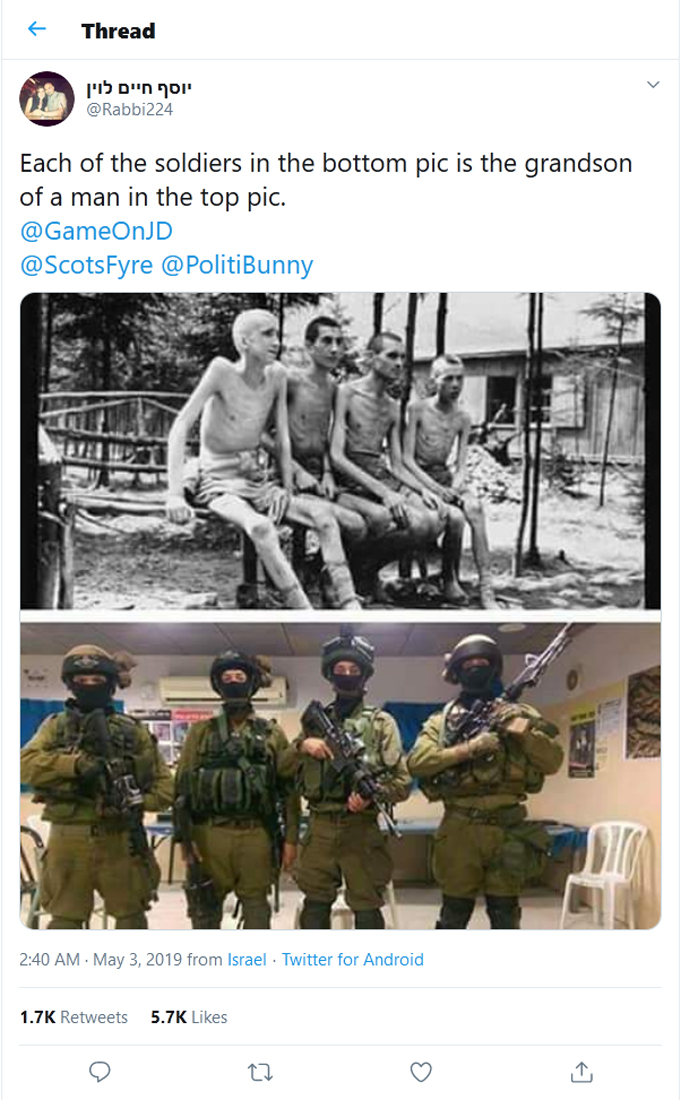 יוסף חיים לוין @Rabbi224 Tweet-03May2019 Each of the soldiers in the bottom pic is the grandson of a man in the top pic. @GameOnJD @ScotsFyre @PolitiBunny New Scholarly Analysis Debunks Anti-Israel Boycotters’ Claim First Amendment Protects “Right” to Violate Anti-BDS LawsStates historically regulated discriminatory boycotts as economic activity, says new article.Posted by Johanna Markind 19January2023 at 07:00am https://legalinsurrection.com/2023/01/new-scholarly-analysis-debunks-anti-israel-boycotters-claim-first-amendment-protects-right-to-violate-anti-bds-laws/ The movement to delegitimize and pressure Israel economically (known as Boycott, Divestment and Sanctions, or BDS) has promoted the idea that boycotts are a type of speech protected by the First Amendment. A new paper exploring the history of American boycotts disputes that claim. Historically, the paper argues, American governments had no problem requiring or prohibiting boycotts. Boycotts were treated as economic activity that governments were entitled to regulate, rather than free speech activity beyond government sanction.
Original link: https://papers.ssrn.com/sol3/papers.cfm?abstract_id=4305186
In their introduction, the paper’s authors (Josh Halpern, a part-time research fellow and law lecturer at Harvard Law School, and Lavi M. Ben Dor, a 2020 graduate of the University of Pennsylvania Law School) argue:
As the authors correctly state, NAACP v. Claiborne Hardware Co. (1982) – perhaps the leading Supreme Court case from the perspective of BDS supporters – carefully avoided ruling on the constitutionality of boycotts themselves.
Instead, the Court concluded that the law in question was too broad in banning boycott-related non-economic activities, like boycott-supporters meeting to express their grievances. The Supreme Court observed that states have broad power to regulate economic activity. Exactly where the line is between regulatable economic activity and a boycott protesting public policy remains unclear. The Halpern-Ben Dor paper emphasizes that contemporary anti-BDS legislation avoids these pitfalls by surgically targeting “only… the boycott, while leaving the ancillary expression untouched.” Furthermore, the laws don’t touch purely private activity, but regulate what activities the state will contract for or subsidize. Instead, the “More than half of U.S. states” that have adopted anti-BDS laws “prohibit… public entities from investing in or contracting with companies that boycott the State of Israel.” Halpern and Ben Dor have done a real service assembling and analyzing state and federal laws boycotting South Africa. The precedent set by these laws is likely to prove crucial in analyzing anti-BDS laws. In particular, the South Africa boycott laws provide precedent for states’ right to express their own values in deciding how to spend or invest state money in connection with a foreign country. The authors explain:
Crucially, the article also identifies legal support for banning boycotts, as well as for laws mandating them. Examples include boycotts targeting Chinese-owned businesses and anti-union businesses. The latter won’t garner much sympathy today, but an anti-Chinese boycott in Montana was suppressed by a federal court injunction. The U.S. State Department endorsed the injunction, as the Chinese legation had supported the claim of the victims, many of whom were Chinese subjects. One issue Halpern and Ben Dor do not address head-on in their paper is how their interpretation played out during the civil rights era. Imagine a case involving an anti-BDS law were to come before the Supreme Court. A lawyer arguing in favor of such a law should prepare to handle a question like: ‘Are you saying that the city of Montgomery could simply have passed a law outlawing the bus-boycott? That it could have forced blacks to patronize segregated buses and nipped the civil rights movement in the bud?’ Halpern and Ben Dor touch upon this a little in their discussion of the Claiborne case, but do not offer a clear answer. That’s not to say no distinction could be drawn. Nearly all the laws banning or adopting boycotts discussed in the article concern foreign commerce or resident foreigners (with the possible exception of colonial boycotts of England, which wasn’t legally a foreign country to American colonists at the time). Conceivably, Halpern and Ben Dor could argue that federal and state governments have expanded powers to regulate commerce with non-citizens and/or non-American businesses or governments, even if they don’t possess the same rights when foreign persons and governments are not involved. Furthermore, the economic activity regulated by anti-BDS laws is states’ own activity. They involve private parties only to the extent that those parties wish to do business with the states. The fact that boycott laws have been passed and enforced in the past does not preclude the Supreme Court from holding that they violate Constitutional principles. Nevertheless, the Halpern-Ben Dor article supports the argument that historically, boycotts and the prohibitions of them were considered to be regulatable economic activity, as opposed to a form of speech protected under the First Amendment. And, of course, they support the right of governments to regulate their own economic activity. [Featured Image: Texas Gov Greg Abbott Signs Anti BDS Law 2017] |
|||
The Nakba of Arabic Jews |
|||
Rabbi Lord Sacks on Anti-Semitism |
|||
Bari Weiss and Deborah Lipstadt discuss the rise of antisemitism at home and abroad |
|||

Pompeo Declares BDS Movement Antisemitic, Seeks to Defund Anti-Israel Boycott CampaignersPosted by Vijeta Uniyal Thursday, November 19, 2020 at 3:00pm https://legalinsurrection.com/2020/11/pompeo-declares-bds-movement-antisemitic-seeks-to-defund-anti-israel-boycott-campaigners/ Secretary of State Mike: “We want to join all the other nations that recognize BDS for the cancer that it is.”The State Department “will regard the global anti-Israel BDS campaign as anti-Semitic,” Secretary Pompeo said during a meeting with Prime Minister Benjamin Netanyahu in Jerusalem.
The State Department “will immediately take steps to identify organizations that engage in hateful BDS conduct, and withdraw US government support for such groups.” Secretary Pompeo announced on the second day of his Israel trip. “We want to join all the other nations that recognize BDS for the cancer that it is,” he added. Thursday’s move will “cut off government support for any organizations taking part in it, a step that could deny funding to Palestinian and international human rights groups,” the Associated Press noted. President Donald Trump’s administration is considering cutting U.S. funding for international activist groups who have been supporting boycott calls against Israel, including big names like Amnesty International, Human Rights Watch, and Oxfam, news reports suggest.
Israeli TV network i24News reported Secretary Pompeo’s remarks:
On Thursday, Secretary Pompeo became the first U.S. Secretary of State to visit Israel’s Judea and Samaria region, often referred to in the mainstream media as the “West Bank.” President Trump last year recognized Israel’s sovereignty over the area. In a symbolic gesture, the Secretary of State visited the Psagot winery in Samaria. The top EU court, the European Court of Justice, in its November 2019 judgment, ruled against the winery, ordering mandatory labeling of products from the Judea and Samaria region as ‘settlement’ goods. “It is a blessing to be here in Judea and Samaria,” he wrote in the winery guestbook. “May I not be the last secretary of state to visit this beautiful land.” Rejecting discriminatory labeling of Israeli products as mandated by the EU, Secretary Pompeo announced on Thursday that products made in areas under Israeli sovereignty, which includes Judea and Samaria, “ will be required to mark goods as “Israel,” “Product of Israel,” or “Made in Israel” when exporting to the United States. ” The Palestinian leadership was angered by Pompeo’s visit to the region and his decision to do away with the discriminatory labeling. “The decision blatantly violates international law,” a spokesman for Palestinian Authority (PA) President Mahmoud Abbas declared. The PA “condemned” the announcement as “yet another biased, pro-Israeli move by US President Donald Trump’s administration,” the Times of Israel reported. ‘Secretary Mike Pompeo in Israel, Announces US Action Against BDS movement.’ Secretary Mike Pompeo in Israel, Announces US Action Against BDS movement
|
|
Trump signs executive order to combat anti-Semitism on college campusesJennifer Kabbany – Fix Editor 11December2019 https://www.thecollegefix.com/trump-signs-executive-order-to-combat-anti-semitism-on-college-campuses/ ‘My administration will never tolerate the suppression, persecution or silencing of the Jewish people’ President Donald Trump on Wednesday signed an executive order that aims to fight anti-Semitism — particularly on college campuses — by clarifying that federal laws protect against discrimination against Jewish people and warning public institutions could lose funding if they ignore “the vile, hate-filled poison of anti-Semitism.” “This action makes clear that Title VI of the Civil Rights Act, which prohibits the federal funding of universities and other institutions that engage in discrimination, applies to institutions that traffic in anti-Semitic hate,” Trump said in a ceremony right before signing the order. “This is our message to universities,” Trump said. “If you want to accept the tremendous amount of federal dollars that you get every year, you must reject anti-Semitism. It’s very simple.” |
|
Brooke Goldstein at the Nuremberg Symposium – May 4, 2016 |
|
The Arabs and their BDS leftist supporters completely ignore SyriaGathering evidence of Syria war crimes in ‘The Assad Files’ |
|
UK Media – Are there any Rules? – A talk by Adam Levick of CAMERA’s UK Media Watch |
|

Despite media narrative, Palestinians are far from ‘woke’By Adam Levick on 26December2018 https://ukmediawatch.org/2018/12/26/despite-media-narrative-palestinians-are-far-from-woke/
At first glance, the headline likely wouldn’t seem controversial. However, if you reflect upon the assumption of the text, you can see an illustration of a larger pattern of media bias in their coverage the region. The headline is culled from a paragraph in which a Palestinian Christian named Sami laments the prospects for peace and a two-state solution if another Likud government is formed – a government the Indy reporter described as “the most right-wing” in Israeli history. Leaving aside the question regarding whether the current government is indeed the most right-wing in history, this framing, which permeates the article, sets up a dichotomy between putatively ‘far-right’ Israelis – in the context of a media which normally uses the word “right” as a pejorative – and, presumably, the more ‘progressive’ Palestinians who “fear” Israel’s dangerous rightward lurch. Though this political contrast is the subtext of the article, Trew never explicitly assigns an ideology to the Palestinians, which is consistent with the manner in which reporters refrain from analyzing the ideology of Palestinians and their leaders – an omission nurtured by the tendency to view Palestinians as victims only, devoid of agency. The media frame the conflict almost exclusively in terms of what Israel does or doesn’t do, which denies news consumers a fuller understanding of the conflict. If journalists were to take Palestinian views and decisions seriously, their readers would see that Palestinians and their leaders are far more ‘right-wing’ than Israelis and their leaders on matters ranging from the treatment of women, support for violence and attitudes towards minorities. Polls from Pew Global and Anti-Defamation League (in 2013 and 2014) reveal the following:
Palestinians, it seems, are not quite the peace and social justice warriors of media lore. They are arguably ‘far-right’, and certainly far from ‘woke’. Whatever the outcome of the upcoming Israeli elections, we suggest taking with a grain of salt ideological characterisations of the new coalition, and treating with even a greater degree of skepticism idealized depictions of Palestinians that serve to reinforce the desired media narrative, yet have little if any relationship to reality. |
|
The secret history BDS hides from youThe secret history BDS hides from you |
|
BDS at the Extremes (Divest This!)A story in Commentary about choices and behaviors within anti-Trump organizations pointed me towards this interesting (and accessible) piece of academic research that discusses experiments on the impact extreme tactics have on popular support for political causes and organizations. The paper looks at what “counter-normative, disruptive, or harmful” political tactics do for two key goals of any social movement: (1) raising the profile of a movement and its causes and (2) gaining support from the wider public (which can take the form of increased membership, donations, or general friendliness towards the movement’s goals). In theory, profile-raising and support-building should go hand-in-hand since the public needs to know about a group and understand its mission and purpose before they can support it. But in our media-saturated age, it often requires extreme tactics to gain attention – especially when competing with other causes, or with other individuals and organizations claiming to represent your issue. This is where extreme tactics such as “inflammatory rhetoric, blocking traffic, and damaging property” come into play since such rhetoric and actions are likely to get you on the nightly news (as well as more web site hits and social media likes) than quietly cultivating the public through rational discourse. But, as it turns out, even those friendly to causes such as animal rights, Black Lives Matter or the anti-Trump movement (the subjects of the study linked above) become less likely to support those causes if their proponents turn to such extreme tactics. In the meaty discussion section of their piece (starting at page 17 if you want to skip the description of their experiments), the authors of the study try to answer the question of why social movements turn to such tactics, given that they seem to be empirically counterproductive. One explanation they suggest is that participants don’t understand or appreciate the negative impact of extreme tactics, confusing increased attention with increased support. The authors also qualify their findings by pointing out that some activists might have goals outside of winning popular support, towards which extreme tactics might make sense, priorities such as “winning funding, impacting powerful elites, psychologically empowering disadvantaged individuals, fostering commitment in existing supporters, and cathartic expression.” To this list I would add another item drawn from experience dealing with the decades-long extremism of the BDS “movement:” fantasy-politics in which the public does not even exist to protestors, except as props in a drama taking place within the protestor’s own individual and collective heads.Scientific evidence that the BDSer’s choice of tactics is likely to limit their effectiveness is a useful thing to know. But such insights can also guide our choices in fighting against BDS and other forms of anti-Israel propaganda, highlighting the importance of tactics and language that will make those we want to persuade feel not just good about us but good about themselves for supporting our cause. Comment: In other words the BDS protesters are Violent and CRAZY!JerusalemCats Comment: To the BDS Nazis and their supporters:
|
|
How to counter the 20 most popular anti-Israel arguments |
|
This is what the Arabs Can get if they have a brain and each sect and tribe can live in “peace” |
|
The Arabs need to think twice before their Imams scream “Kill the Jews”
|
|
 Grand Mufti of Jerusalem Haj Amin al-Husseini and Adolf Hitler December 1941 |
|
THE NAZIS AND THE PALESTINIAN MOVEMENT |
|
 READY TO ROAST MARSHMALLOWS, KIDS?: A Gaza summer camp. Were any of these children among the “civilian casualties” that Hamas is claiming? (screenshot: from a Reuters slideshow in June) Jewish Students need to defend themselves against the BDS thugs. Know your rights; You are not a Dhimmi, a Floor Rag or a Target for Nazis. Defend yourselves! If there is “Blood on the Street” make sure that it is their “Blood on the Street” and not yours. Learn to protect yourself. Create a local JDL (JEWISH DEFENSE LEAGUE) chapter, learn self defense, Join the IDF before University with the Lone Soldiers Program.Colleges and Universities cannot, for even a moment, tolerate or excuse the violences advocated by the BDS twisted totalitarian mindset. The BDS thugs should be made to pay for encouraging a campaign of violence on campus. BDS is not “Free Speech” under US law. (United States v. O’Brien). BDS is illegal in Israel and BDS Threats of violence and intimidation against the Jews and their supporters are illegal everywhere.BDS is about Hate and AntisemitismBDS leader succinctly describes what they consider “success” Here he admits the entire point of BDS is to portray Israel as a “leper state maintaining a cruel occupation, apartheid and a colonial enterprise.”… |
|
Palestinian Media: Fake News, Real Harm. But Why? |
|
All About the Facts |
|
FLOTILLA: We Con the World |
|
The Truth About Jerusalem |
|

 The names of the three boys who were kidnapped on Thursday night 12June2014 ט״ו בְּסִיוָן תשע״ד have been cleared for publication. They are Naftali Frankel, 16 from Nof Ayalon near Modi’in; Gilad Shaar, 16, from Talmon in the West Bank near Ramallah, and Eyal Yifrach, 19 from Elad in central Israel near Petah Tikva. Naftali Frankel is a dual American-Israeli citizen. Please Pray for Them Yaakov Naftali ben Rachel Devorah Gilad Michael ben Bat Galim Eyal ben Iris Teshurah |
|
|
|

‘Blacklist’ of BDS groups releasedFull list of organizations to be prevented entry into Israel published. Interior Minister: ‘These people slander the Land.’Ido Ben Porat, 07 January 2018 http://www.israelnationalnews.com/News/News.aspx/240361 The Israeli government has compiled a list anti-israel organizations backing the Boycott, Divestment, and Sanctions movement whose activists will not be allowed to enter Israel. These organizations operate consistently against the State of Israel, the government has argued, while putting pressure on other organizations, institutions and countries to boycott Israel. The organizations’ activities are carried out through a false propaganda campaign aimed at undermining Israel’s legitimacy in the world. The names of the boycott organizations will be transferred to the Immigration and Population Authority in the Ministry of the Interior for the purpose of preventing entry into Israel. Interior Minister Aryeh Deri said, “As head of the Entry into Israel Law, I made it clear that I will use my authority to prevent the entry of members of organizations and individuals whose sole purpose is to harm the State of Israel and its security. These people take advantage of the law and our hospitality to act against Israel and slander the Land. I will work against this in every way. ” Minister of Strategic Affairs Gilad Erdan said that “the consolidation of the list is another step in our struggle against the incitement and lies of the boycott organizations. No country would allow visitors who come to harm the country to enter it, and certainly when the goal is to destroy Israel as a Jewish state.” The complete list: Europe • AFPS( (The Association France Palestine Solidarité) • BDS France • BDS Italy • ECCP (The European Coordination of Committees and Associations for Palestine) • FOA (Friends of Al-Aqsa) • IPSC (Ireland Palestine Solidarity Campaign) • Norgeׂׂ (The Palestine Committee of Norway) Palestinakomitee • PGS- (Palestine Solidarity Association in Sweden) Palestinagrupperna i Sverige • PSC (Palestine Solidarity Campaign) • War on Want • BDS Kampagne US • AFSC (American Friends Service Committee) • AMP (American Muslims for Palestine) • Code Pink • JVP (Jewish Voice for Peace) • NSJP (National Students for Justice in Palestine) • USCPR (US Campaign for Palestinian Rights) Jerusalem Cats Comment: What about “Americans for Peace Now’ – Supporters of the self hating, anti Israel group Shalom Achshav or New Israel Fund which pays for many leftist NGOs in Israel to cause problems in Israel. Latin America • BDS Chile South Africa • BDS South Africa International • BNC (BDS National Committee) |
|
The real and unabridged ‘Black List’ of BDS groupsIsrael’s publicized current Boycott Divestment and Sanctions (BDS) blacklist is a partial one at best. Lee Kaplan, 08 January 2018 http://www.israelnationalnews.com/Articles/Article.aspx/21530 14 Friends of Palestine (Marin, California) Adalah-NY Black Lives Matter Boston 2 Palestine Campus Action Network (part of Al Sharpton’s Action Network) Christian Peacemaker Teams (Part of American Friends Service Committee) Friends of Sabeel (FOSNA) with headquarters In Bethlehem, Christian anti-Semites General Union of Palestinian Students (GUPS) San Francisco State Global Exchange-Medea Benjamin’s group Interfaith Peace Builders-Santa Cruz, California Middle East Childrens’ Alliance in Berkeley, California Mondoweiss website Muste Foundation N.Y. Norcal ISM, Free Palestine Movement, Free Gaza Movement (all three are Paul Larudee) National Lawyers Guild Presbyterian Synod Rachel Corrie Foundation For Peace and Justice South Bay Mobilization-San Jose, California US Campaign for the Academic and Cultural Boycott of Israel (pacbi.org) United Church of Christ Palestine/Israel Network United Methodist General Board of Church and Society Vermonters for Just Peace WESPAC Foundation-N.Y. Women in Black Women’s International League for Peace and Freedom The above groups are the more active ones, but there are many more. Also excluded from the list: Al Awda Palestine Right to Return Coalition (One leader lives in Beit Sahour) Olive Tree Initiative is in many California colleges subsidized by taxpayers In addition, major Muslim groups that promote BDS in the US are: Arab Action Network-Chicago CAIR -Council on American Islam ic Relations If Americans Knew- San Rafael, California Ifnotnow Muslim Public Affairs Committee Muslim Students Association (most colleges) Still other groups active in promoting BDS: American Nazi Party www.nsm.org Columbia BDS a.k.a. Apartheid Divest Council for the National Interest -Saudi backed anti-Semites Duke Divest-Duke University International ANSWER-a Marxist coalition of groups seeking socialist takeover International Socialist Organization- Marxists who advocate violent overthrow of US government Jews For Justice For Palestinians- UK based ISM group La Voz De Azatlan – Chicano group advocates US Southwest be ceded to Mexico La Raza-Chicano Revolutionary group Middle East Studies Association Nation of Islam-Farrakhan Veterans For Peace-Seattle Veterans Today-Fake Veterans website Who Profits – Dalit Baum (In Israel and USA) |
 Ben & Jerrys Targets Anti Semite Demographic With Audacious New Ice Cream Flavors. Reverend Al Sharpton and Minister Louis Farrakhan (Photo by R. Diamond/WireImage) Ben & Jerry’s Ice Cream BDS and the response: |
|||||||
|
|
||||||
“It always has been Arab Muslim Orthodoxy that “Palestine” actually is the entire country of Israel, not merely Judea and Samaria. All PLO terror aimed is to drive the Jews out of Tel Aviv, Haifa, Ra’anana, and other cities, towns, and villages in pre-1967 Israel and “into the [Mediterranean] sea.”This is what it means to be ‘Pushed into the Sea’
Ben & Jerry’s: We will not sell our products in the “Occupied Palestinian Territories”Popular ice cream company to continue doing business within pre-’67 borders, but ends services in Judea and Samaria in BDS win.Arutz Sheva Staff, 19July2021 https://www.israelnationalnews.com/News/News.aspx/310170 The Ben & Jerry’s ice cream company announced Monday that it would end all sales in Judea and Samaria, caving to the BDS movement.
“Ben & Jerry’s will end sales of our ice cream in the Occupied Palestinian Territory,” the company stated.
“We believe it is inconsistent with our values for Ben & Jerry’s ice cream to be sold in the Occupied Palestinian Territory (OPT). We also hear and recognize the concerns shared with us by our fans and trusted partners,” the statement said,
“We have a longstanding partnership with our licensee, who manufactures Ben & Jerry’s ice cream in Israel and distributes it in the region. We have been working to change this, and so we have informed our licensee that we will not renew the license agreement when it expires at the end of next year.
Although Ben & Jerry’s will no longer be sold in the OPT, we will stay in Israel through a different arrangement. We will share an update on this as soon as we’re ready,” the ice cream company concluded.
|
|||||||

CEO of Ben & Jerry’s Israel: They have been pressuring me for a year and a halfAvi Zinger, CEO of Ben & Jerry’s Israel, responds to global company’s decision not to sell in Judea and Samaria: I do not intend to surrender.Elad Benari, 20July2021 https://www.israelnationalnews.com/News/News.aspx/310193 Avi Zinger, CEO of Ben & Jerry’s Israel, on Monday commented on the global Ben & Jerry’s corporation’s decision to boycott Judea and Samaria, telling Channel 12 News he has no intention of stopping the sales of the ice cream in Judea and Samaria.
“It is inconceivable that the company decides to cause harm for political reasons, and mix ice cream and politics,” said Zinger.
Zinger said he had been under heavy pressure from Ben & Jerry’s global corporation. “I heard about the decision more or less together with everyone,” he said, “but I have been under pressure for about a year and hearing demands to stop marketing in Judea and Samaria. Of course, I have been opposed to it all along. Ever since the operation in Gaza the pressure from the company has increased.”
“I did not agree to surrender to this and I am not willing to continue to surrender to it,” stressed the CEO of Ben & Jerry’s Israel. “I have been with them for 25 years, I brought it to Israel. I was informed two hours ago that since I am not willing to cooperate on this issue, they will not extend my agreement in year and a half,” said Zinger.
He reiterated that he “does not plan and does not even intend to stop” selling the ice cream in Judea and Samaria. He noted that there is another year and a half until the end of the franchise agreement with the company, and he hopes that by then the company will change its mind.
“I very much hope that during this year and a half the government and the whole public will support us and fight against this unusual phenomenon,” he said, adding that he expects Unilever, which is the owner of the global Ben & Jerry’s corporation, to understand the situation. “After all, they sell in the territories. They operate here. They have factories and hundreds and thousands of workers. They cannot deny the situation.”
Zinger fears people will stop buying the ice cream. “In fact, this is my main concern. People do not differentiate between the Israeli independent company and the global company. This has happened in the past when Ben & Jerry’s took controversial action and accused us of supporting Hamas.”
“In the end, this is the Israeli government’s war against the boycotts and the BDS – and we are caught in the middle,” the CEO of the Israeli company added. “I hope that the entire public and government officials will support us, and vice versa – that they will consume more and fight the phenomenon. It starts with Ben & Jerry’s and you do not know where it will end.” |
|||||||
Ben & Jerry’s-Gate: What You Need to KnowDavid Lange | 20July2021 https://www.israellycool.com/2021/07/20/ben-jerrys-gate-what-you-need-to-know/ … But now that I have had time to process things more, the reaction – at least for those of us living in Israel – should not be to boycott Ben & Jerry’s in Israel just yet. Ben & Jerry’s Israel has not stopped at this announcement, but is going out of their way to ‘troll’ Ben & Jerry’s corporate: In other words, we should continue to support the Israeli licensee for the next year and a half.Peak BDSBen & Jerry’s announcement seems to be ‘peak BDS’:
Members of Ben & Jerry’s Board Wanted a Full Boycott of IsraelBen & Jerry’s Board Member Anuradha Mittal might seem to be one of those behind the boycott move, but even she is unhappy with the end result, which is not a boycott of the entire state of Israel:
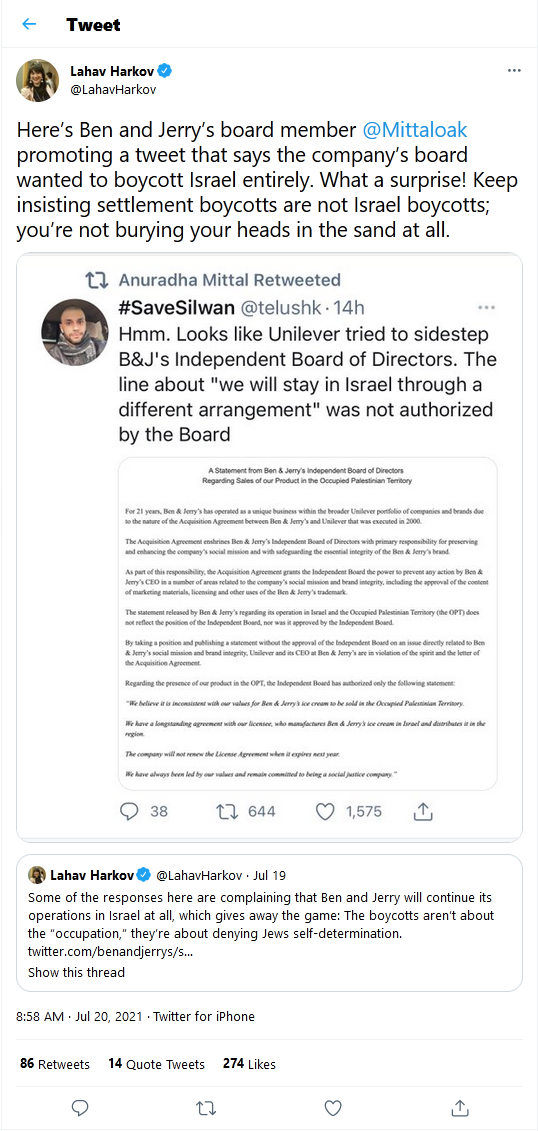 Lahav-Harkov-tweet-20July2021-Here’s Ben and Jerry’s board member Mittaloak promoting a tweet that says the company’s board wanted to boycott Israel entirely. So any suggestion this is not an antisemitic move is disingenuous. Tweets:
|
|||||||

Ben & Jerry’s ‘insider’ links company board to activist kicked out of IsraelInside source claims Ben & Jerry’s board advised by former director of Human Rights Watch in Israel who was expelled from the country.Arutz Sheva Staff, 22July2021 https://www.israelnationalnews.com/News/News.aspx/310392 Ben & Jerry’s announcement on Monday that it would stop selling its ice cream in Judea and Samaria, caving in to pressure from BDS, had many people wondering who was advising the Vermont-based company.
Constitutional & international law professor Eugene Kontorovich, who is an expert on legal issues in the Israeli-Arab conflict, said on Twitter that he had a “scoop” on the company’s decision.
“SCOOP (on Ben & Jerry’s): I’ve been told by (a Ben & Jerry’s) insider that company’s board invited Omar Shakir, a professional BDS activist, to advise them, rejected calls to hear experts on other side. This ain’t about the settlements,” he tweeted.
In a response to Kontorovich’s tweet, NGO Monitor said, “Not surprising since Omar Shakir was kicked out of Israel for being a BDS activist. First he pressured FIFA, then airbnb, and now Ben & Jerry’s. His entire ‘human rights’ career has been devoted to pressuring companies to boycott Israel.”
In 2019, Shakir, who was the regional director of Human Rights Watch in Israel, was deported from Israel after a court ruled he had promoted the BDS movement’s agenda. |
|||||||

Ben & Jerry’s Israel Boycott Could Cost UnileverThe decision to shun the country has legal implications in many states and perhaps even at the federal level.By
Ben & Jerry’s, the Vermont-based ice-cream company that prides itself on its progressive politics, announced Monday that it is cancelling its license with its Israeli affiliate. The move by Ben & Jerry’s, a wholly owned subsidiary of global consumer-products giant Unilever, amounts to a boycott of Israel. And this triggers a wave of legal and regulatory issues for the Dutch-American parent.
Ben & Jerry’s operates in Israel through a licensee, an Israeli company that has been with the brand for 30 years and operates one of its few foreign manufacturing facilities. After a social-media pressure campaign from anti-Israel leftists, the company insisted that the Israeli licensee not sell ice cream in parts of Jerusalem, including the Jewish Quarter, and the West Bank, much of which is controlled by the Palestinian Authority and parts of which are under Israeli civil jurisdiction.
Ben & Jerry’s knew this was an offer the licensee had to refuse. Parts of what the company calls “occupied Palestinian territory” Israel (as well as the U.S.) considers sovereign Israeli territory. Israeli law bars boycotts of Israeli citizens, Jewish or Arab, based on their location. So Unilever cancelled the Israeli Ben & Jerry’s entirely because it wouldn’t engage in a secondary boycott.
Because Ben & Jerry’s is a wholly owned subsidiary of Unilever, the latter is responsible for its boycott. In the past eight years, 33 American states have passed laws that restrict government contracting or investing in companies that boycott Israeli people or businesses. These laws are modeled on similar restrictions on companies that discriminate on other grounds, such as sexual orientation.
This means that, in about a dozen states, state employees’ pension funds will be barred from investment in Unilever. In many other states, government entities will be barred from buying goods or services from Unilever. Moreover, since the 1970s, federal law has banned U.S. companies from participating in foreign boycotts of any country. If it turns out that the Palestinian Authority contacted Ben & Jerry’s or its officers and asked them to boycott, criminal penalties would be available against Unilever.
Ben & Jerry’s suggests that its action is motivated by the Israeli “occupation.” But the company seems to have decided to end its Israel business in May, when Hamas unleashed a 10-day rocket barrage on Israeli civilians. Ben & Jerry’s has not boycotted anyone but the Jewish state. And that is what the state and federal boycott laws recognize—that refusals to deal with Israelis are most often a form of bigotry.
Mr. Kontorovich is director of the Center for the Middle East and International Law at George Mason University’s Scalia Law School.
Copyright ©2021 Dow Jones & Company, Inc. All Rights Reserved. 87990cbe856818d5eddac44c7b1cdeb8
Appeared in the July 22, 2021, print edition as ‘Ben & Jerry’s Boycott Could Cost Unilever.’
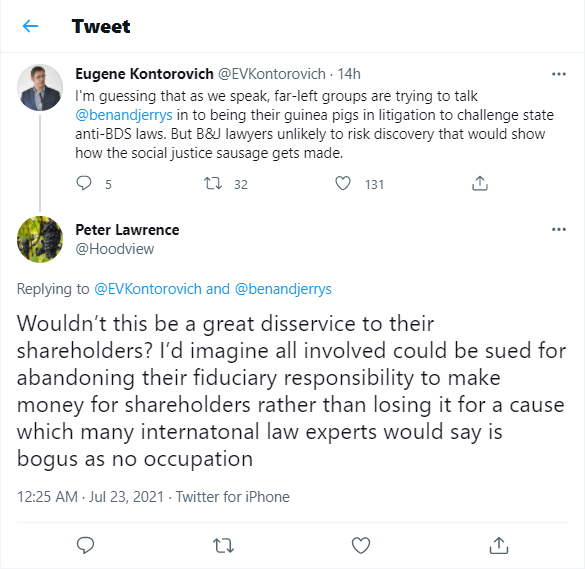 Eugene-Kontorovich-tweet-22Jluly2021-far left groups are trying-to talk ben & jerrys in to being their guinea pigs
|
|||||||

Double Scoops and Double Standards Courtesy of Ben & Jerry’s | OpinionDAVID MAY, RICHARD GOLDBERG AND ORDE KITTRIE, FOUNDATION FOR DEFENSE OF DEMOCRACIES
In addition to its classic double scoops, Vermont-based ice cream producer Ben & Jerry’s is now offering a calorie-rich serving of double standards, too. The Ben & Jerry’s brand, owned and operated by Unilever, announced on July 19 that it would terminate its license agreement with an Israeli-based manufacturer to ensure its products “will no longer be sold” in the “Occupied Palestinian Territory.” Unilever cut off the longstanding licensee after it refused to halt sales in the disputed territories, which reportedly would violate Israeli law. In short, Unilever engaged in a boycott of Israel as defined by state and federal law, which means the company may soon be facing penalties that eat into its profits.
Unilever is a British multinational consumer goods company headquartered in London, U.K. It has annual revenues of $61 billion (£45 billion) and its products are available in over 190 countries. It also maintains corporate offices in numerous human rights-abusing countries, including China, Pakistan, Russia, Saudi Arabia, Turkey, Venezuela, Vietnam and Zimbabwe. Unilever is reportedly a major purchaser of tomato paste from state-owned factories in China’s Xinjiang region, where the U.S. State Department says China is engaged in “horrific abuses.” In January 2021, the U.S. government halted the import of all such tomato paste into the U.S., citing the use of forced labor that amounted to “exploiting modern slavery.” Yet neither Unilever nor Ben & Jerry’s appears to have ever taken action against China’s massive human rights violations in Xinjiang.
It is difficult to say why Unilever shows greater concern for the sale of ice cream in West Bank settlements than it does for the exploitation of forced labor in Xinjiang, yet the company’s board members and senior executives have a lengthy record of criticizing the Jewish state. Jeff Furman, the president of the Ben & Jerry’s Foundation’s board and former chair of the corporate board, visited the West Bank in 2012 on a tour organized by an activist group that advocated for boycott, divestment and sanctions (BDS) against Israel. Furman also signed a letter that condemned Israeli military operations in Gaza, but conspicuously never mentioned Hamas—the terrorist outfit that runs Gaza. Furthermore, he has called for the end of U.S. aid to Israel and has falsely claimed that Palestinians endure “apartheid living conditions.”
Anuradha Mittal, Furman’s replacement as corporate board chair, has similarly demonstrated her selective emphasis on the Israeli government’s actions. The Oakland Institute, which she directs, produced a series of nine reports condemning Israel in 2017. Mittal announced that she deleted her Airbnb account in May 2019 after Airbnb reversed its own short-lived boycott of Israel. Moreover, she publicly opposed a congressional resolution condemning anti-Semitism and signed a petition in June 2021 calling to end U.S. arms sales to Israel.
The Ben & Jerry’s independent board distanced itself from the brand’s July 19 announcement—objecting to a clause stating that Ben & Jerry’s would continue operating in “pre-1967” Israel and reasserting its autonomy to make “social justice” decisions under its 2000 merger agreement. This underscores that Unilever does indeed share responsibility for the boycott decision. Unilever’s release of the boycott announcement under the Ben & Jerry’s brand—and its admission that Unilever, not Ben & Jerry’s, will be the corporate entity that cuts off the Israeli licensee—demonstrates that the parent company has ultimate control over Ben & Jerry’s operations.
Furthermore, Unilever cannot hide behind its merger agreement to claim its hands are tied by Ben & Jerry’s independent board. Such an agreement cannot legally require Unilever to violate state or federal laws and thus put the company and its shareholders in jeopardy. Doing so—as it appears Unilever has—opens the company to potential shareholder litigation.
The Ben & Jerry’s boycott, and Unilever’s role in it, has ramifications under both U.S. federal and state laws. Federal anti-boycott laws, adopted by Congress in the late 1970s and renewed by bipartisan majorities in 2018, prohibit U.S. companies from participating in anti-Israel boycotts sponsored by foreign countries. Federal law also specifically reflects the U.S. government’s opposition to divestment from Israel, which it defines to include divestment that is “politically motivated” and “intended to penalize or otherwise limit commercial relations specifically with Israel or persons doing business in Israel or in any territory controlled by Israel.”
In addition to federal anti-boycott measures, more than 30 U.S. states have additional laws, resolutions or executive orders designed to stop boycotts of Israel. Many state-level anti-BDS laws define such boycotts to include any actions that are politically motivated and intended to limit commercial relations with companies based in the State of Israel or in territories controlled by the State of Israel. On its face, the announcement that Unilever and Ben & Jerry’s will not renew a contract with an Israeli-based manufacturer as part of a politically motivated campaign to influence Israeli government policies constitutes a boycott of Israel as defined.
These laws typically require the state to hold parent companies, not just subsidiaries, legally responsible for boycotts of Israel—all the more so when, as in the Ben & Jerry’s situation, the parent is the actual implementer of boycotting business activities. Twelve state laws require their public pension funds to divest from businesses that boycott Israel and/or forbid the state to contract with boycotters. States like New Jersey (where Unilever is headquartered in the United States), Illinois, Florida and Texas may soon divest their public pension funds from Unilever and warn fund managers against holding Unilever positions within broader index funds. Likewise, state governments in Florida, Georgia, Michigan, Texas and elsewhere may soon find that they are prohibited from contracting with Unilever for soap, shampoo, tea and, yes, ice cream. That could receive support from environmentalists, as Unilever was listed in 2019 as one of the world’s top ten plastic polluters.
As the parent company of Ben & Jerry’s, Unilever’s involvement with the Ben & Jerry’s decision could also constitute a breach of fiduciary duty to the company’s shareholders. To avoid harming their shareholders, Unilever executives will need to work quickly to reverse the Ben & Jerry’s decision.
President Joe Biden has vowed that his administration will “firmly reject the BDS movement—which singles out Israel and too often veers into anti-Semitism—and fight other efforts to delegitimize Israel on the global stage.” Ben & Jerry’s and Unilever have fallen into precisely the trap Biden warned of: Their double standards constitute a form of discrimination. Calling off their boycott is the right thing to do—not merely the right decision for their shareholders.
David May is a research analyst at the Foundation for Defense of Democracies (FDD), where Orde Kittrie is a senior fellow and Richard Goldberg is a senior advisor. FDD is a nonpartisan think tank focused on foreign policy and national security issues. Follow David, Orde and Richard on Twitter: @DavidSamuelMay, @OrdeFK and @Rich_Goldberg. Follow FDD on Twitter: @FDD.
The views expressed in this article are the writers’ own. JerusalemCats Comments: Time for Jews and Christians to boycott Unilever and if you are living outside of the Land of Israel to boycott Ben & Jerry’s Ice Cream. Make this a BDS Case Study on what not to do. |
|||||||

Pressure Increases on Unilever Over Ben & Jerry’s West Bank Boycottby Algemeiner Staff 21JULY2021 https://www.algemeiner.com/2021/07/21/pressure-increases-on-unilever-over-ben-jerrys-west-bank-boycott/ |
|||||||
| Backlash continued in Israel on Wednesday to the news that Ben & Jerry’s planned to end sales in the West Bank and eastern Jerusalem, as the ice cream maker’s parent company Unilever faced increasing pressure over the controversial decision.Israeli President Isaac Herzog called the general boycott efforts against Israel a “new type of terrorism — economic terrorism,” pledging to oppose attempts to harm the Israeli economy.
“The [Boycott, Divestment, and Sanctions] campaign does not pursue peace and seeks to undermine the very existence of the state of Israel,” he said, speaking at an event for the late former Israeli leader Yitzhak Shamir. “It is aiming its arrows at the Israeli economy.”
On Monday, Ben & Jerry’s announced that the US ice-cream maker would not renew its license agreement with its current Israeli partner, saying that it was “inconsistent” with its values to sell products in “the Occupied Palestinian Territory.”
The Burlington, Vermont-based company said it would seek to continue to sell products in the country under a different arrangement, outside the West Bank. Its parent company, the consumer goods multinational Unilever, has already faced various attempts at using political and legal pressure to reverse the move.
In Hempstead, in Long Island, Councilman Bruce Blakeman promised that the town would direct its commissioners to cease contracts and municipal business with the ice-cream maker and Unilever, in accordance with municipal anti-BDS legislation.
“At the Town of Hempstead, we will continue to work only with those who reject acts of hate and economic hostility,” Blakeman said in a statement.
Others went further, such as US Sen. James Lankford, an Oklahoma Republican, who called for “blocking the sale” of Ben & Jerry’s in the state and in state-owned facilities.
The supermarket chain Morton Williams, which runs 15 stores in New York and one in New Jersey, said it would reduce the Ben & Jerry’s produce carried on its shelves, while kosher markets from New Jersey to Florida said they would stop carrying the brand altogether.
In a Tuesday press conference, US State Department spokesperson Ned Price declined to respond to the Ben & Jerry’s move, calling it “the actions of a private company,” but reiterated that the US “firmly rejects” the BDS movement for singling out Israel. |
|||||||

‘Ben & Jerry’s will regret the day they boycotted Israel’Shurat Hadin-Israel Law Center announces plans to assert control of Ben & Jerry’s trademark in Judea and Samaria, arguing that by pulling its business from the area, Unilever has lost the right to protect the brand.By Yair Altman 25July2021 https://www.israelhayom.com/2021/07/25/ben-jerrys-will-regret-the-day-they-boycotted-israel/ The decision by ice cream giant Ben & Jerry’s to pull its business beyond the Green Line means that under US law its parent company, Unilever, has lost the right to protect the brand’s trademark in Judea and Samaria, the Shurat Hadin-Israel Law Center announced over the weekend.
The NGO said it plans to apply for trademark licensing of a similar brand under the name “Judea and Samaria’s Ben & Jerry’s” with the explicit intent of rivaling the original.
Last week’s decision by Ben & Jerry’s, widely panned as a capitulation to the anti-Israeli boycott, divestment and sanctions movement, was slammed by lawmakers from across the political spectrum, as well as by Jewish groups worldwide.
Prime Minister Naftali Bennett vowed to fight the decision “aggressively,” saying, “There are many ice cream brands, but only one Jewish state. Ben & Jerry’s decided to brand itself as the anti-Israel ice cream. This decision is morally wrong and I believe that it will become clear that it is also commercially wrong.”
Unilever’s CEO Alan Jope stressed last week that the multinational consumer goods company, whose Israeli branch among the five leading consumer products companies operating in the country, was “fully committed to our business in Israel.”
In a letter to Unilever, Shurat Hadin asserted that it plans to assert ownership of the brand in Judea and Samaria, citing us legislation that under US law, in order for Unilever to preserve trademark protection for the Ben & Jerry’s brand name against use by other entities, it must demonstrate full intent to conduct business in a particular area.
By announcing that the company does not intend to operate in Judea and Samaria, the British conglomerate has forfeited the right to claim said trademark as its own, the NGO argued.
Shurat Hadin chief Nitsana Darshan-Leitner told Israel Hayom that “Unilever is no longer in a position to enforce its trademark in these areas.
“These are our new weapons and approach in the war against BDS: Anyone who stops selling their products in Israel will find that we have taken over their trademarks and rights. Ben & Jerry’s will regret the day they boycotted Israel. ”
Brooke Goldstein, executive director of the Lawfare Project and co-founder of the End Jew Hatred movement, said last week that the sheer size of Unilever opens it up to possible significant financial penalties.
“By virtue of its wayward subsidiary, Unilever – a massive international conglomerate – risks potentially crushing financial consequences in terms of its ability to receive investments from, or do business with, the majority of US states,” she said. |
|||||||

US Jewish org applauds stand taken by Ben & Jerry’s franchiseesThirty American franchises send letter to Ben & Jerry’s executives denouncing company’s decision to boycott Judea and Samaria.Dan Verbin, 05August2021 https://www.israelnationalnews.com/News/News.aspx/311218 The American Jewish Committee (AJC) praised a group of Ben & Jerry’s franchisees in the United States who are urging the company to reconsider its decision to boycott Judea and Samaria.
They went on to explain the decision’s harm to them personally and to their businesses. “There is a danger in the pursuit of social justice will descend into political correctness or result in the adoption of overly simplistic solutions by people who share a single view of the world that misconstrue complex problems in which multiple claims of justice are implicated,” they said.
The franchisees behind the letter own 30 Ben & Jerry’s locations with a total revenue of $23.3 million.
They wrote that they were “proud to be part of a company that highlights values as a part of its mission” but the “imposition of such narrow prescriptions does not advance social justice, or the pursuit of a values led business in any meaningful way.”
“The decision that has been made to terminate the contract with Ben & Jerry’s licensee in Israel not only distorts the situation on the ground – it has imposed and will to continue to impose, substantial financial costs on all of us,” they said. “More importantly, the controversy your recent actions have brought upon our local businesses has had an adverse effect on the value of our independently owned franchises and investments.”
They added that their families and communities “have shamed us personally for doing business not just with a company that draws controversy, but with one that continues to consider the calculated negative affect on its franchisees as acceptable collateral damage.”
The American Jewish Committee applauded the letter, noting that the franchisees had approached them for help with drafting the letter which was addressed to Ben & Jerry’s CEO, Director of Social Mission, Director of Global Retail Operations, and Head of U.S. Retail and Global Strategy.
AJC Chief Legal Officer Marc D. Stern lauded the franchisees for their courage in directly taking the company to task.
“Tagging one side with all responsibility for the Israeli-Palestinian conflict may make self-described social justice advocates proud, but it advances neither peace nor justice,” Stern wrote in a letter to the editor published in the New York Times on Thursday in response to the Ben & Jerry’s co-founders’ Times opinion piece defending their company’s decision.
Stern noted that while the co-founders claimed the company’s intent is only to stop serving Judea and Samaria, and not all of Israel, “The chair of the company’s board of directors has publicly said it wanted to boycott Israel but was overruled (wrongly she believed) by its parent company, Unilever, and now may do so only under unspecified arrangements. The failure of Ben and Jerry to address that reality fatally undercuts their argument.”
Jake Novak, the Broadcast Media Director for the Consulate General of Israel in New York, said on Twitter that the franchisees letter was “very, very important.”
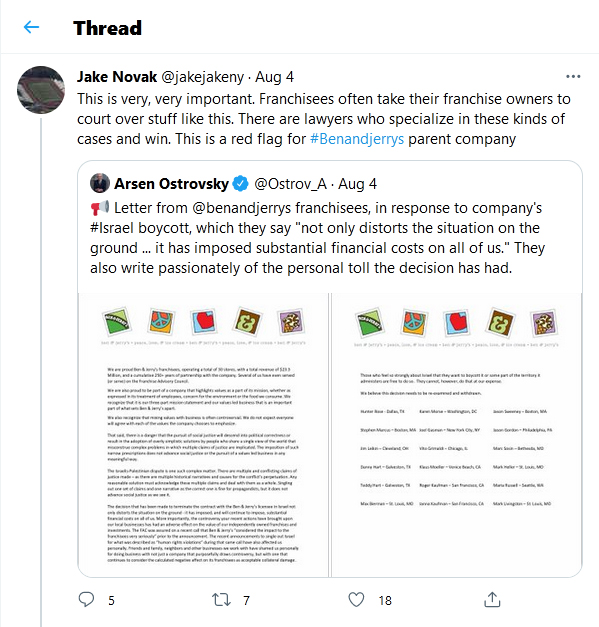 Jake Novak @jakejakeny · Aug 4 This is very, very important. Franchisees often take their franchise owners to court over stuff like this. There are lawyers who specialize in these kinds of cases and win. This is a red flag for #Benandjerrys parent company |
|||||||
Ben Shapiro: Most US Jews aren’t Jewish in their identityJerusalemCats Comments: This is what the Jews In Name Only “Useful idiot” do not understand about living in israel.Not So Safe Spaceיום הזיכרון Yom HaZikaron Memorial Day ‘Boyfriend’ Controversial ad from Israeli Ministry of Immigration These flags are flags of the Nazi Youth Organization “Hitler-Jugend”, regional branch of Palestine. The historical context to the Grand Mufti of Jerusalem, Haj Amin Al-Husseini.” Every Israeli will understand this message. Will the Americans understand what we have to go through both as Civilians and in the Military? Just because someone is not in uniform does not mean they are not a target for an Arab Nazi (Fatah, Hamas, Hezbollah ect.) terrorist. The Arabs have always been Nazis and they are still Nazis. An open letter to Ben Cohen and Jerry GreenfieldMen of ice cream, men of unjust deserts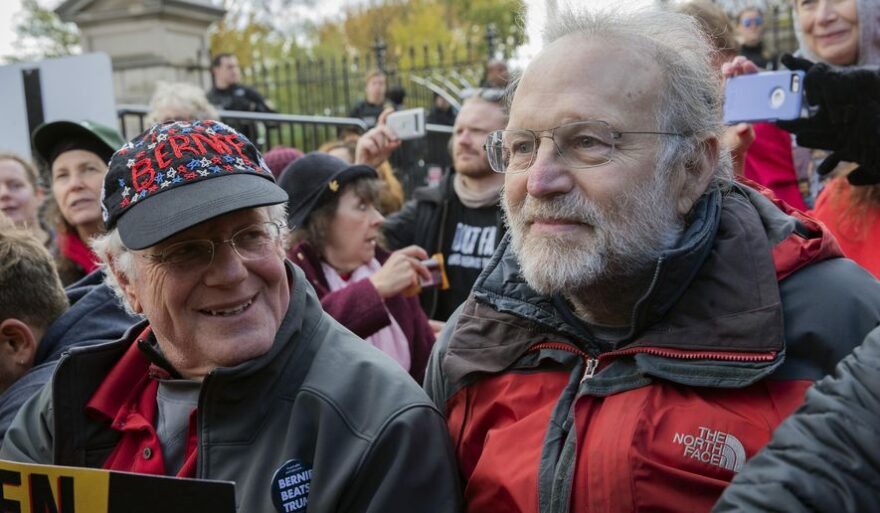 Ben Cohen, left, and Jerry Greenfield, co-founders of Ben & Jerry’s ice cream, attend a protest in Washington. The Vermont-based Ben & Jerry’s has always been known for promoting social causes as much as its flavors of ice cream, but few have attracted as much attention as its decision to stop selling its ice cream in the Israeli-occupied West Bank and contested east Jerusalem. Nov. 8, 2019 (AP Photo/Patrick Semansky, File) By Clifford D. May 03August2021 https://www.washingtontimes.com/news/2021/aug/3/an-open-letter-to-ben-cohen-and-jerry-greenfield/ ANALYSIS/OPINION: Or is it okay if I call you Ben and Jerry? (You can call me Cliff!) So, anyhow, I read your op-ed in The New York Times, headlined, “We’re Ben and Jerry. Men of Ice Cream, Men of Principle,” and I thought you might like – or at least tolerate – a little feedback.
First: You call yourselves supporters of Israel. I don’t doubt it. But you should be aware that the BDS (“boycott, divest and sanction”) movement with which you’re now associated openly seeks Israel’s extermination.
“Definitely, most definitely we oppose a Jewish state in any part of Palestine,” Omar Barghouti, founder and leader of the movement (it’s really an agit-prop campaign) has said. “No Palestinian, rational Palestinian, not a sell-out Palestinian, will ever accept a Jewish state in Palestine.”
Perhaps you believe that the Palestinian state Mr. Barghouti hopes to see replace the Jewish state would refrain from killing or expelling Jews, and allow them to remain as a minority. But that’s hardly a safe bet considering what’s happened to Jews elsewhere in the region. (You know what I’m talking about, right?) And is there any country in the Middle East (other than Israel) where minorities – Kurds, Bahai, Druze, Christians, whatever – enjoy even basic rights?
In fact, in Gaza and the areas of the West Bank governed by the Palestinian Authority, selling land to Jews is a crime (with the death penalty for those who transgress), bounties are paid to terrorists who murder Jews (children included), and the educational system demonizes Jews (not just Israeli Jews). None of that is boycott-worthy?
Your second point is that “it’s possible to support Israel and oppose some of its policies.” Agreed. The policy you most vociferously oppose is the presence of Israelis in the West Bank. But consider: If Israelis were to withdraw from the West Bank, as they withdrew from Gaza in 2005, is it not probable (inevitable?) that the West Bank would become what Gaza has become?
I hope you’re aware that after the Israelis left Gaza – removing every soldier, farmer, synagogue, and cemetery – Hamas forcibly drove out Palestinian rivals. Since then, Hamas has ruled the territory. Since then, Hamas, along with Palestinian Islamic Jihad (both backed by the regime in Tehran which calls Israel a “cancerous tumor”) have been waging war against Israelis utilizing rockets, terrorist tunnels, incendiary kites, etc.
If Hamas takes over the West Bank, how long before rockets are fired at Israelis in nearby Jerusalem and Tel Aviv? Israelis will respond. Both Israelis and Palestinians will be killed. Your policy preference will have helped bring about this carnage. You’re okay with that?
Maybe you’ll say that Israelis need to work out a two-state solution. But they’ve tried. Offers were made in 2000, 2001, and 2008, not to mention the 1937 Peel Commission proposal and the 1947 U.N. plan which would have created one state for Palestinian Arabs and one for Palestinian Jews. Those offers were rejected by Palestinian leaders. No counteroffers followed.
It’s been years since Palestinian Authority President Mahmoud Abbas has been willing to engage in serious talks with Israelis. He’s currently demanding concessions as a pre-condition for returning to the table.
My theory: At age 85, he’s contemplating his legacy. He wants his portrait hanging next to that of Yasar Arafat not used for target practice – as would happen were he to end his career as a “sell-out Palestinian” shaking the hand of an Israeli leader on the White House lawn.
Other Arab leaders know this. It’s one reason many are no longer unfriendly to Israelis, some even signing the Abraham Accords. A prominent Arab leader (you’d know his name, but the conversation was off-the-record) told me that he and others are “fed up” with Mr. Abbas.
There’s much more you should know but may not. For example, the “occupied territories” were seized by the Israelis from Jordan – not from Palestinians – in the defensive war of 1967,
Jordan had conquered that territory, then known as Judea and Samaria, in the 1948 war against Israel. Jordan subsequently renamed it “the West Bank” (for obvious reasons), forcibly expelled all Jews, desecrated Jewish religious sites, and prohibited Jews from worshipping at their holiest sites.
Prior to Jordan’s occupation, the West Bank had been ruled by Britain. Before that, for centuries, it was a backwater of the Ottoman Empire.
For these and other reasons, the “occupied territories” are in truth disputed territories – of which the world has many: Western Sahara, Cyprus, Catalonia, Crimea, Tibet, Taiwan, among them. Do you think the Uighurs of Xinjiang would choose to be ruled by Chinese Communists?
Unusually and perhaps uniquely, Israelis are willing to give – to say “give back” would be inaccurate – disputed territories to Palestinians in exchange for nothing more than peaceful coexistence. To date, no Palestinian leader has been willing to accept that deal.
You’re encouraging such rejectionism. Your boycott asserts that Jews have no right to live in “Palestinian territories” – which even includes the ancient Jewish Quarter of Jerusalem.
This is why The Babylon Bee recently headlined: “Ben & Jerry‘s Introduces Fun New Flavor ‘Push The Jews Into The Sea Salt Caramel.’” The article adds: “All proceeds will go to Iranian rocket manufacturers to arm noble Hamas mujahideen warriors in their fight to destroy the Jews.”
The Bee is a satirical newspaper but there’s a double scoop of truth in its recognition that you’re serving Israelis unjust deserts.
Ben and Jerry, one of your flavors is “Half Baked.” If you’re really “men of principle,” you’ll ponder what I’ve said here, and ask yourselves whether your anti-Israeli boycott doesn’t qualify for the same moniker. Your friend, Cliff • Clifford D. May is founder and president of the Foundation for Defense of Democracies (FDD) and a columnist for the Washington Times.
|
|

Boycotting the Western WallWe need to stop pretending that the Ben & Jerry’s argument is over a handful of wild-eyed “settlers” on remote hilltops. This is a fight over boycotting the Western Wall. Op-ed.Stephen M. Flatow, 03August2021 4:53 AM https://www.israelnationalnews.com/News/News.aspx/311040
(JNS) The media coverage of the Ben & Jerry’s controversy has described it as the company’s decision not to sell ice-cream in “the West Bank” or in “Israeli settlements.” There’s just one problem: Ben & Jerry’s has never used those terms.
Look closely at the official Ben & Jerry’s announcement that ignited the controversy. Notice that the only geographic terms it uses is “Occupied Palestinian Territory.” Same for the July 27 tweet by Ben & Jerry’s board chair Anuradha Mittal.
And look at the op-ed in The New York Times by the founders of Ben & Jerry’s—Bennett Cohen and Jerry Greenfield—on July 28. They wrote that the company will “end business in the occupied territories,” and they referred to “the territories Israel occupies.” The words “settlements” and “West Bank” did not appear anywhere in the op-ed, just as they did not appear in the company’s announcement.
That’s not by accident. Announcements and op-eds of this significance are not just dashed off without a thought. The company made a major business decision with millions of dollars at stake. Such statements are crafted by teams of writers and advisers. Every word is carefully chosen. They go through draft after draft before getting final approval.
According to the Palestinian Arabs, as well as the various U.N. resolutions supporting them, “East Jerusalem” is part of the “Occupied Palestinian Territory.” Read their statements. Read their resolutions. That’s what they say. That’s what they believe.
Now, notice that the Bennett Cohen-Jerry Greenfield op-ed in the Times acknowledged that they are basing their views on the United Nations. They wrote that the decision “to end business in the occupied territories” was based on the grounds that “a majority of the international community, including the United Nations, has deemed [Israel’s presence] an illegal occupation.”
Well, if the source of their authority is the United Nations, then that means they consider “East Jerusalem” to be “occupied,” too. And therefore, we can assume that they will be refraining from selling their ice-cream there.
What is “East Jerusalem,” exactly? It’s the part of the city that Israel liberated as part of the Six-Day War in June 1967. It includes the walled Old City, where the Jewish Quarter, whose longtime residents were forcibly evacuated during Israel’s War of Independence, Western Wall and Temple Mount are located; the adjoining Mount of Olives cemetery, which is the oldest Jewish cemetery in the world; mixed Jewish-Arab neighborhoods such as Shimon HaTzadik (Sheikh Jarrah) and Kfar Shiloah; and the various Arab neighborhoods around the eastern edge of the city.
“East Jerusalem” also includes numerous major Jewish neighborhoods that lie partly, or entirely, beyond the pre-1967 armistice line, such as Ramot, French Hill, Gilo and Ramat Shlomo.
Mittal has made it crystal-clear that she considers eastern Jerusalem “occupied territory.” As recently as July 30, for example, she re-tweeted a statement about “Israeli occupiers” arresting Arab rock-throwers “from Sultan Suleiman Street in J’salem.” Sultan Suleiman Street runs along the walls of the Old City. Part of it is within the pre-1967 armistice line, part of it is beyond. To the chair of the Ben & Jerry’s board, it’s all “occupied.”
So why, in their official announcements, has Ben & Jerry’s been coy about Jerusalem? Because they know what would happen if they said, openly: “Our company is boycotting the Old City, the Western Wall and Temple Mount because we consider it to be Occupied Palestinian Territory.” The volume of protests that Ben & Jerry’s is facing would be ten-fold what it is now. The Gristedes supermarket chain would not be reducing its Ben & Jerry’s shelf space by 30 percent, as they have announced; they would reduce it by 100 percent. Delta would not still be serving Ben & Jerry’s on its flights to Israel; neither would any other airline.
But as long as the company makes it seem as if it’s just targeting “settlements,” a certain segment of the Jewish community will support them. A number of left-wing Jewish groups, including J Street, Americans for Peace Now and Partners for Progressive Israel, have issued statements taking the side of the ice-cream makers.
A divided Jewish community undermines the anti-Ben & Jerry’s protests and makes it more likely that the company will stick to its guns. The backing of Jewish left-wing groups enables Ben & Jerry’s to say, “See? We’re not anti-Semitic. We’re not anti-Israel. Look at these Jewish groups that support us.”
Could an organization such as the Union for Reform Judaism remain on the sidelines if a major American company says it is boycotting the Western Wall? I don’t think so.
It’s time for Ben & Jerry’s, and its left-wing Jewish supporters, to stop playing word games. Stop trying to pull the wool over the public’s eyes. Stop pretending that this is an argument over a handful of wild-eyed “settlers” on remote hilltops. This is a fight over boycotting the Western Wall. They know it, and we know it.
Stephen M. Flatow is an attorney in New Jersey and the father of Alisa Flatow, who was murdered in an Iranian-sponsored Palestinian terrorist attack in 1995. He is author of “A Father’s Story: My Fight for Justice Against Iranian Terror.” JerusalemCats Comments: “Could an organization such as the Union for Reform Judaism remain on the sidelines if a major American company says it is boycotting the Western Wall?”
|
|
Ben and Jerry’s Israel-All Kashrut Cholov Yisroel NO Kitniyot-Pesach Ice Cream
Another reason to make Aliyah! Nefesh B’Nefesh: Live the Dream US & CAN 1-866-4-ALIYAH | UK 020-8150-6690 or 0800-085-2105 | Israel 02-659-5800 https://www.nbn.org.il/ info@nbn.org.il It’s time to come home! Nefesh B’Nefesh: Live the Dream 1-866-4-ALIYAH |
|

Without an Aggressive Response, Ben & Jerry’s Decision Is a Harbinger of Further Divestment From Israelby Julie Hammerman 29JULY2021 https://www.algemeiner.com/2021/07/29/without-an-aggressive-response-ben-jerrys-decision-is-a-harbinger-of-further-divestment-from-israel/ Companies hate controversy. Controversy threatens a company’s reputation and future earnings. With the dramatic growth of corporate social responsibility over the past decade, activists have increasingly generated controversy about companies in order to change corporate behavior on a range of social issues.
Often these changes are positive – an increased focus on environmental concerns, or diversity and equity issues, for example.
But BDS activists started applying these same tactics over a decade ago in order to push for corporate divestment from Israel. And they have been successful — as was the case with Ben & Jerry’s. After the Ben & Jerry’s announcement, Omar Barghouti, a BDS leader, declared, “We expect more socially responsible companies to follow suit, perhaps less publicly.”
And more companies may follow suit — especially if the Jewish community doesn’t launch an aggressive and prolonged counter controversy aimed at Ben & Jerry’s and parent company Unilever.
Most companies will do an analysis of their economic and political interests to determine whether submitting to the BDS movement is in their interests. Without pro-Israel pushback, companies may follow suit and divest from Israel — not because they agree with the BDS movement, or harbor antisemitism, but because they hate controversy.
On Unilever’s quarterly earnings call last week, UBS analyst Guillaume Delmas asked, “Where do you draw the line between purpose and an active political agenda?” Delmas was acknowledging that BDS is a political campaign that is manipulating Unilever’s corporate social responsibility goals.
Unilever CEO Alan Jope tried to calm the analysts on the call by saying, “It is not our intent to regularly visit matters of this level of sensitivity … certainly not our intention that every quarter we’ll have one as fiery as this one.” Ironically, on the same call, Jope detailed Unilever’s ice cream sales growth in China, without any mention of the litany of social concerns that surround China.
To combat BDS, it’s time to turn up the heat on Jope and ensure he has fiery quarterly earnings calls until the company’s support for BDS is reversed. All tactics are useful including press attention, boycotts, state pension divestment mandates, shareholder resolutions, protests outside stores, social media, petitions, etc. BDS activists didn’t invent these controversy-generating tactics — they just embrace them more comfortably than the Jewish community.
There has been a debate over the past week among American Jewish progressive leaders on whether the Jewish community should be so vocal on Ben & Jerry’s. Some have suggested that when the Jewish community exerts power, it only creates more antisemitism — or that Ben & Jerry’s capitulation is an acceptable version of BDS since Unilever added a sentence to the Ben & Jerry’s board announcement stating that the company would like to stay in Israel but not the “Occupied Palestinian Territories.”
But the time to get loud on Ben & Jerry’s is now. There should be no hesitation, no fear about antisemitism — which will exist regardless of whether the Jewish community exerts influence or sits quietly. There should be no slicing and dicing of BDS by Jewish organizations focused on battling with Israel over the settlements; the goal of BDS is to rid the world of Israel, and the settlements are just a stepping stone. There will be time for difficult conversations about the conflict, but now is the time to respond to the prolonged campaign of economic warfare aimed at Israel.
The Jewish community needs to realize the power and scope of the corporate social responsibility and socially responsible investing movements, and the uncomfortable fact that the BDS campaign’s narrative on Israel has thoroughly infiltrated these influential arenas.
As a result, companies are under enormous sustained pressure to avoid or divest from Israel.
Launching a counter controversy assault on Ben & Jerry’s and Unilever may or may not make the company back away from supporting BDS, but more importantly, it will signal to the CEOs of the 124 global (non-Israeli) companies actively being pressured by BDS that the controversy doesn’t go away once the company acquiesces to BDS — it only gets worse.
Julie Hammerman is the CEO of JLens, an investor network that serves as the bridge between the Jewish community and the socially responsible investing and corporate social responsibility movements. JLens’ Jewish Advocacy Strategy, with $130M invested by Jewish institutions, conducts investor advocacy with US public companies on Jewish communal concerns, including combating BDS. |
|
The Ben and Jerry’s Foundation has funded BADIL, a Palestinian NGO that supports terror and promotes antisemitism25July2021 Elder of Ziyon https://elderofziyon.blogspot.com/2021/07/the-ben-and-jerrys-foundation-has.html Ben and Jerry’s controls the Ben and Jerry’s Foundation which supports various social justice causes. In 2017, the Foundation gave some $80,000 to the Oakland Institute, a think tank whose executive director is Anuradha Mittal, the head of Ben and Jerry’s Board of Directors who has shown her antipathy towards Israel and sympathy towards terror groups on multiple occasions.
Of that amount, thousands were earmarked for the BADIL Resource Center for Palestinian Residency and Refugee Rights, which is dedicated to destroying Israel through the “right of return.” But BADIL is much worse than that. In December of 2016, before this grant, BADIL issued a report that justified Palestinian terror – and said that Israel doesn’t have the right to defend itself from rockets and terrorists.
BADIL allows that there are rare instances where individual Palestinians might have crossed a legal line, but then says that Israel cannot retaliate against entire armed terror groups that sent them on their murderous mission. BADIL says that it is open season on Jews in Israel.
Before that, and certainly known to the Oakland Institute, BADIL cosponsored the 4th Annual Al-Awda Award in 2010 for posters, papers and caricatures. The second place award for caricatures, with a cash prize, went to this blatantly antisemitic cartoon: This wasn’t the only brush with antisemitism from BADIL. Its director Nidal Al-Azza, wrote in 2007 that it isn’t only Zionism that is racist, but Judaism itself:
All of this was known at the time Ben and Jerry’s Foundation decided to grant thousands of dollars to BADIL, through Anuradha Mittal’s own foundation. Is antisemitism and explicit support for murdering Jews in Israel part of the “social justice” that Ben and Jerry’s promotes? |
|
Unilever Sells Ben & Jerry’s Israeli Business To Defuse BDS RowBy Henriette Chacar  Tubs of ice-cream are seen as a labourer works at Ben & Jerry’s factory in Be’er Tuvia, Israel July 20, 2021. (Photo: Reuters / RONEN ZVULUN ) Unilever on Wednesday sold its Ben & Jerry’s ice cream business in Israel to its local licensee for an undisclosed sum, aiming to smooth over a potentially damaging diplomatic row over the company’s political stance.
The deal comes after the U.S. ice cream brand announced last year it would stop marketing products in the Israeli-occupied Palestinian territories, saying that selling there was “inconsistent” with its values. Under the new arrangement Ben & Jerry’s ice cream will be available to all consumers in Israel and the occupied West Bank.
The episode highlighted the challenges facing consumer brands taking a stand on Israel’s military occupation of the Palestinians, such as San Francisco-based Airbnb, which in 2019 reversed its decision to delist Israeli settlements.
The international boycott, divestment and sanctions (BDS) movement seeks to pressure Israel to abide by international law in its treatment of the Palestinians. Israel says such boycotts are discriminatory and anti-Semitic.
On Wednesday, Israel’s foreign ministry called the Ben & Jerry’s deal “a huge victory.”
“We will fight delegitimization and the BDS campaign in every arena, whether in the public square, in the economic sphere or in the moral realm,” Israel’s Foreign Minister Yair Lapid said in a statement.
Last year, Israel condemned the sales boycott as “morally wrong” and said Unilever would face “severe consequences.” The consumer goods giant defended Ben & Jerry’s autonomy, but said it was “fully committed” to Israel and would find a solution by the end of this year.[L1N2UL25W]
Unilever had said previously it did not support the BDS movement, and reiterated that stance in a statement on Wednesday.
The new owner is the brand’s long-time Israeli ice cream licensee Avi Zinger, owner of American Quality Products. Zinger had sued Ben & Jerry’s after its decision in the West Bank, saying the company illegally severed their 34-year relationship.
“The new arrangement means Ben & Jerry’s will be sold under its Hebrew and Arabic names throughout Israel and the West Bank under the full ownership of its current licensee,” Unilever said.
A representative for the Vermont-based Ben & Jerry’s said the company does not agree with Unilever’s announcement and will no longer profit from Ben & Jerry’s in Israel.
“We continue to believe it is inconsistent with Ben & Jerry’s values for our ice cream to be sold in the Occupied Palestinian Territory,” the representative told Reuters.
REACTIONS Pension officials in at least six U.S. states had restricted or sold Unilever stock or bonds to protest the Ben & Jerry’s decision, among them New York State Comptroller Thomas DiNapoli, Texas State Comptroller Glenn Hegar, and Arizona Treasurer Kimberly Yee. [L1N2RP1ZE] Representatives for all three told Reuters on Wednesday they would review Unilever’s move.
Billionaire activist investor Nelson Peltz, who is joining the board of Unilever next month, was involved in the discussions to bring about the resolution, said Rabbi Abraham Cooper, associate dean of the Simon Wiesenthal Center, a human rights organization that supported the deal. Peltz is the chairman of the center’s board of governors.
Peltz met with Unilever CEO Alan Jope in September before Trian Partners, the investment fund Peltz runs, bought any shares, to discuss the situation, a person familiar with the matter said.
Trian Partners commended the new arrangement in a statement, saying that “respect and tolerance have prevailed.”
Ben & Jerry’s and its independent board maintained the right to decide on its social mission when it was bought by Unilever in 2000. But Unilever said it “reserved primary responsibility for financial and operational decisions and therefore has the right to enter this arrangement.”
Israel captured the West Bank, part of the territory Palestinians want for an independent state, in a 1967 Middle East war. Most countries consider Israeli settlements on Palestinian land to be illegal. Israel disputes this.
“The return of Ben and Jerry’s to Israeli settlements, which were built on Palestinian land, exposes it to international legal accountability and its name will be on the United Nations blacklist of companies operating in settlements,” The Palestine Liberation Organization’s Wasel Abu Yussef told Reuters.
Omar Shakir, Israel and Palestine Director at Human Rights Watch, said the deal sought to undermine the “principled decision” to stop selling the ice cream in Israeli settlements.
“What comes next may look and taste similar, but, without Ben & Jerry’s recognized social justice values, it’s just a pint of ice cream,” he said in a statement.
Ben & Jerry’s Jewish founders, Ben Cohen and Jerry Greenfield, no longer manage the brand but are well known for their commitment to social justice. The company has recently expressed strong support for the Black Lives Matter movement, LGBTQ+ rights and electoral campaign finance reform.
© Copyright Thomson Reuters 2022. All rights reserved. |
|
בן & ג’ריס ישראל תוכל להמשיך למכור גלידה בכל רחבי ישראלhttps://www.benjerry.co.il/whats-new/arrangement/ הישג משמעותי לבן & ג’ריס ישראל והבעלים והמנכ”ל אבי זינגר: בהסדר שנחתם עם חברת יוניליוור העולמית הוסכם כי החברה הישראלית תמשיך לייצר ולמכור גלידה בכל רחבי ישראל – ללא הגבלת זמן. ההסדר מסיים את המחלוקת בין הצדדים. בן & ג’ריס ישראל (American Quality Products), בבעלות אבי זינגר מודיעה היום (ד’) על חתימת הסדר עם חברת יוניליוור הבינלאומית המבטיח את המשך פעילות המפעל ומכירת הגלידה בכל רחבי ישראל. ההסדר מסיים את המחלוקת בין הצדדים, שנוצרה בעקבות סירובה של בן & ג’ריס האמריקנית לחדש זיכיון המכירה של זינגר בן 35 השנים, אשר אפשר לו לייצר ולמכור גלידת בן & ג’ריס בכל רחבי מדינת ישראל. במסגרת ההסדר שנחתם, הוסכם כי אבי זינגר ירכוש את הזכויות לייצר ולמכור את גלידת בן & ג’ריס, ללא הגבלת זמן, במדינת ישראל. הסדר זה מבטיח את המשך פעילות מפעל בן & ג’ריס ישראל בבאר טוביה באופן עצמאי ללא תלות בחברת יוניליבר, ואת הביטחון התעסוקתי של מאות העובדים במפעל, וכן את פרנסתם של אלפי ישראלים ופלסטינים שאמונים על האספקה והשירותים, עליהם מסתמך המפעל. אבי זינגר, מנכ”ל ובעלים, בן & ג’ריס ישראל אמר בעקבות ההסדר: “אני שמח מאוד שלאחר חודשים ארוכים של מאבק, הצלחנו להבטיח כי נמשיך לייצר ולמכור את גלידת בן & ג’ריס האהובה לכלל לקוחותינו, ללא אפליה, בכל רחבי ישראל ויהודה ושומרון. אני מודה ליוניליוור על נכונותם להגיע לפתרון, ולעמדתם הנחרצת נגד תנועת ה-BDS. זה היה מאבק ממושך ומורכב, חוצה גבולות ומגזרים. מדובר בניצחון משמעותי עבורנו ועבור כל מי שמאמין בשיתוף פעולה ודו קיום, ובתבוסה מהדהדת לאלו הדוגלים באפליה ובחרמות”. “אני רוצה להודות בשמי ובשם עובדי המפעל על התמיכה המשמעותית שקיבלנו מחברי כנסת מכל קצוות הקשת הפוליטית בישראל, וממשרד החוץ בראשות שר החוץ יאיר לפיד. אני מודה על מאמצם של נציגי ממשל במדינות רבות בארה”ב, אשר יזמו סנקציות חמורות בתגובה לחרם, לארגונים יהודים ופעילים מרחבי העולם, שתמכו במאבק. תודה גם לעליזה לוין והצוות שלה ממרכז ברנדייס ולמארק צל ונתן לוין, שעבדו ללא לאות כדי להגיע לתוצאה המיוחלת. התמיכה שקיבלנו מכל עבר היא זו שאפשרה את ההחלטה המשמחת הזו. אני שמח שנוכל להתמקד כעת במה שאנחנו עושים הכי טוב מזה 35 שנה – הכנת גלידת פרימיום איכותית לכולם, ללא יוצאים מן הכלל”. Ben & Jerry’s Israel will continue to sell ice cream all over IsraelSignificant achievement for Ben & Jerrys Israel and owner and CEO Avi Singer: In an agreement signed with the global Unilever company, it was agreed that the Israeli company will continue to produce and sell ice cream throughout Israel – indefinitely. The settlement ends the dispute between the parties. Ben & Jerry’s Israel (American Quality Products), owned by Avi Singer, announces today (Wednesday) the signing of an agreement with the international company Unilever, which ensures the continued operation of the factory and the sale of ice cream throughout Israel. The settlement ends the dispute between the parties, which arose following the refusal of American Ben & Jerry’s to renew the 35-year-old Singer’s franchise, which allowed him to produce and sell Ben & Jerry’s ice cream throughout the State of Israel. As part of the agreement signed, it was agreed that Avi Singer would acquire the rights to produce and sell Ben & Jerry’s ice cream, indefinitely, in the State of Israel. This arrangement ensures the continued operation of the Ben & Jerrys Israel plant in Beer Tuvia independently of Unilever , and the employment security of the hundreds of workers in the plant, as well as the livelihoods of thousands of Israelis and Palestinians in charge of the supply and services on which the plant relies. Avi Singer, CEO and owner, Ben & Jerrys Israel said following the arrangement: “I am very happy that after many months of struggle, we were able to ensure that we continue to produce and sell the beloved Ben & Jerrys ice cream to all our customers, without discrimination, all over Israel and Judea and Samaria. I thank Unilever for their willingness to reach a solution, and for their firm stance against the BDS movement. It was a long and complex struggle, crossing borders and sectors. It is a significant victory for us and for everyone who believes in cooperation and coexistence, and in a resounding defeat for those who advocate discrimination and boycotts. “ “I would like to thank on my behalf and on behalf of the factory workers for the significant support we have received from Knesset members from all corners of the political spectrum in Israel, and from the Ministry of Foreign Affairs headed by Foreign Minister Yair Lapid. I am grateful for the efforts of government representatives in many countries in the United States, who have initiated severe sanctions in response to the boycott, of Jewish organizations and activists from around the world, who supported the struggle. Thanks also to Aliza Levin and her team from the Brandeis Center and Mark Shadow and Nathan Levin, who worked tirelessly to achieve the desired result. The support we received from all sides is what made this happy decision possible. I am happy that we can now focus on what we have been doing best for 35 years – making quality premium ice cream for everyone, without exception. “ |
|

הסכם מול יוניליוור: הזכיין הישראלי ימשיך למכור גלידת בן אנד ג’ריס בהתנחלויותפרסום ראשון: אחרי לחץ כבד מאוד שהופעל בשנה האחרונה על תאגיד יוניליוור – נחתם הסדר עם היצרן המקומי של גלידות בן אנד ג’ריס, שסירב לוותר על מכירת המוצרים בהתנחלויות. “ניצחון משמעותי עבור כל מי שמאמין בשיתוף פעולה ובדו-קיום”, מסר הזכיין. לפיד: “האנטישמים לא ינצחו אותנו, גם לא בגלידה”איתמר אייכנר, מירב קריסטל|29.06.22 | 15:42
פרסום ראשון: הזכיין הישראלי של חברת הגלידות בן אנד ג’ריס, אבי זינגר, הודיע בצהריים (רביעי) כי הגיע להסדר מול תאגיד יוניליוור העולמי – שיאפשר לו להמשיך למכור את הגלידות שהוא מייצר גם בהתנחלויות, בניגוד למה שהחברה האמריקנית דרשה. המחלוקת שהתפתחה בשנה שעברה סביב מכירת הגלידות, כך נראה, הגיעה לסיומה.
במסגרת ההסדר שנחתם, הובטח לזינגר להמשיך לייצר את הגלידה כפי שעשה ב-35 השנים האחרונות ללא הגבלת זמן או מגבלת מכירה, והזכיין הישראלי ציין כי הסיכום מאפשר את המשך פעילות המפעל בבאר טוביה שמעסיק מאות עובדים, ואת פרנסתם של אלפי ישראלים ולפסטינים שאמונים על האספקה והשירותים של המפעל.
מה שאפשר את ההסדר מול יוניליוור שעוקף את חברת בן אנד ג’ריס האמריקנית הייתה הסכמה ולפיה האריזות יוחלפו לכאלו שהכיתוב בהן יהיה בעברית ובערבית – ולא באנגלית. כמו כן, תמונתם של מייסדי החברה, בנט כהן וג’רי גרינפלד, תוסר מהאריזה בישראל.
Google translation: Agreement with Unilever: The Israeli franchisee will continue to sell Ben & Jerry’s ice cream in the settlementsFirst publication: After very heavy pressure on Unilever Corporation in the past year, an agreement was signed with the local ice cream manufacturer Ben & Jerry’s, which refused to give up selling the products in the settlements. “A significant victory for anyone who believes in cooperation and coexistence,” the franchisee said. Lapid: “Antisemites will not defeat us, not even ice cream”Itamar Eichner, Meirav Krystal 29.06.22 | 15:42 https://www.ynet.co.il/news/article/bytj4ptc9
As part of the agreement signed, Singer was promised to continue producing the ice cream as he has done for the past 35 years with no time limit or sales limit, and the Israeli franchisee noted that the agreement allows the plant to continue operating in Beer Tuvia and employ thousands of Israelis and Palestinians in supply and services. Of the factory.
What made possible the arrangement with Unilever, which bypasses the American Ben & Jerrys company, was an agreement according to which the packaging would be replaced with those with the caption in Hebrew and Arabic – and not in English. Also, the photo of the company’s founders, Bennett Cohen and Jerry Greenfeld, will be removed from the packaging in Israel. |
|

Israeli Students Troll Ben & Jerry’s Over Its Occupation Of Abenaki LandEnd Ben & Jerry’s Occupation! How come it doesn’t have the now-fashionable “Land Acknowlegment” on its cartons.Posted by Johanna Markind 13August 2022 at 06:00pm https://legalinsurrection.com/2022/08/israeli-students-troll-ben-jerrys-over-its-occupation-of-abenaki-land/ A letter signed by a thousand Israeli students accuses BDS-supporter Ben & Jerry’s of hypocrisy in illegally occupying Vermont land that belongs to Abenaki Indians while self-righteously refusing to do business in “occupied Palestinian territory.”
 Adam-Milstein-tweet-10August2022-Too good! To recap the background: in July 2021, the ice cream company joined the BDS movement, announcing it would no longer sell ice cream in what it called “occupied Palestinian territory,” a/k/a Judea and Samaria. Ben & Jerry’s Israeli licensee, Avi Zinger, brought the ice cream to Israel some 35 years ago when the Vermont company was young. He both manufactures and distributes Ben & Jerry’s ice cream in Israel. He refused to comply with the boycott. Last August, the ice cream company announced it wouldn’t renew Zinger’s license after it expires at the end of 2022. Zinger sued Ben & Jerry’s and its corporate owner, Unilever. The latter then sold Ben & Jerry’s business in Israel and the territories to Zinger. Ben & Jerry’s then sued Unilever, claiming the sale violated the rights of the ice cream company’s independent board, which was responsible for safeguarding its “social mission.” That suit is now pending.
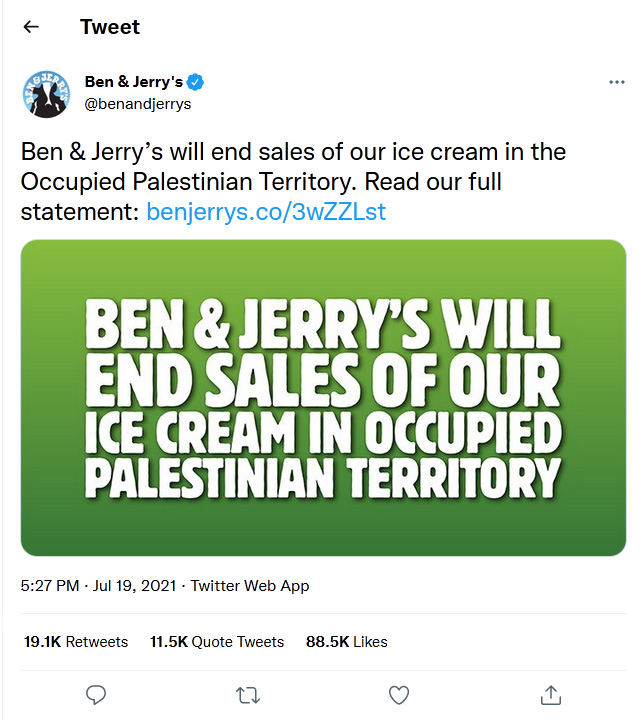 Ben-&-Jerry’s-tweet-19July2021-Ben & Jerry’s will end sales of our ice cream in the Occupied Palestinian Territory. We’ve previously covered the controversy here:
The letter, signed by more than a thousand Israeli students and academics affiliated with Students for Justice in America and supported by Shurat HaDin – Israel Law Center, accused Ben & Jerry’s of operating their Vermont factory on lands belonging to the Abenaki people. LIF reached out to Shurat HaDin requesting a copy of the letter, but did not receive a response. As reported in the New York Post, the letter included the following:
As the letter states, the land where Ben & Jerry’s is based used to belong to the Abenaki, a Native American tribe that lived throughout what are now New England and New Brunswick at the time European colonists first arrived in New England. The tribe’s traditional homeland included Vermont, where Ben & Jerry’s headquarters is located. After having been welcomed by them (like the Abenaki chief Samoset, who welcomed the Pilgrims), English colonists fought several wars with the Abenaki and eventually forced the survivors to settle in what was then French Quebec.
Ben & Jerry’s has long claimed to embody values including “Human Rights & Dignity,” “Social & Economic Justice,” and “Environmental Protection, Restoration, & Regeneration.” Its website boasts about its “Progressive Values”:
Despite Ben & Jerry’s pretensions about its “progressivism” and “social mission,” its website includes no land acknowledgement accepting the problematic way European colonies gained control of the land from Native Americans. Such statements have become de rigueur among the politically correct. University of Vermont Abenaki Land Acknowledgement
For example, the University of Vermont, the campus of which is located about three miles away from Ben & Jerry’s headquarters in Burlington, Vermont, has a Land Acknowledgment on its website that states the following:
Ben & Jerry’s has not issued a public statement about the letter, or responded to LIF’s inquiry about it. UPDATE (8-15-2022) Shurat HaDin – Israel Law Center has provided LIF with a copy of the letter sent to Ben & Jerry’s. You can see it here. The letter, signed by 1,000 Israeli students and academics, was sent on behalf of a group called Students for Justice in America – an Israeli answer to the American group Students for Justice in Palestine. Ben & Jerry’s still hasn’t publicly responded to the letter. Perhaps they are realizing, People who live in glass houses shouldn’t throw stones. SJA Letter with 1000 Signatures_ [Click on image to see document.]
|
|

Court Denies Ben & Jerry’s Request to Stop Unilever’s Already-Consummated Sale of Ice Cream Maker’s Israeli BusinessJudge denies Ben & Jerry’s woke board’s moot motion and rejects its claims of speculative injuries.Posted by Johanna Markind Monday, August 22, 2022 at 09:00 pm https://legalinsurrection.com/2022/08/court-denies-ben-jerrys-request-to-stop-unilevers-already-consummated-sale-of-ice-cream-makers-israeli-business/ On August 22, Judge Andrew L. Carter, Jr., denied Ben & Jerry’s motion for an injunction in its lawsuit against its corporate owner, Unilever. We’ve previously covered the controversy here:
To recap briefly, Ben & Jerry’s “brand integrity” board sued Unilever to stop it from selling the ice cream maker’s business in Israel to its long-term Israeli licensee/manufacturer/distributor, Avi Zinger and his company, American Quality Products Limited (AQP). This, despite the fact that Ben & Jerry’s didn’t raise the issue in the same case or even sue in the same court adjudicating Zinger’s suit against – and now settlement with – Unilever. Unilever completed the sale to/irrevocable license with Zinger in June. So what’s the rush? The judge found that there wasn’t any.
During an August 8 telephonic hearing on the motion for a preliminary injunction, the judge seemed underwhelmed by Ben & Jerry’s claim that it might create a new flavor to which Zinger might give a different interpretation, all of which might cause Ben & Jerry’s fan club to look askance at it.
The judge wanted to know more about the ice cream company’s claim there was imminent danger Unilever would sell rights to its normal, English-language trademark to Zinger. (Zinger had been sold or irrevocably licensed the right to use Ben & Jerry’s name in Hebrew and Arabic, not in English.) Because the issue was first raised during the hearing, Unilever was caught a little flat-footed. Its lawyers followed up the next day with a letter to the judge, explaining a sale of rights to the English-language trademark wasn’t in the offing:
Letter from defense counsel to court. [Click on image to see document.] The judge’s brief opinion and order stated:
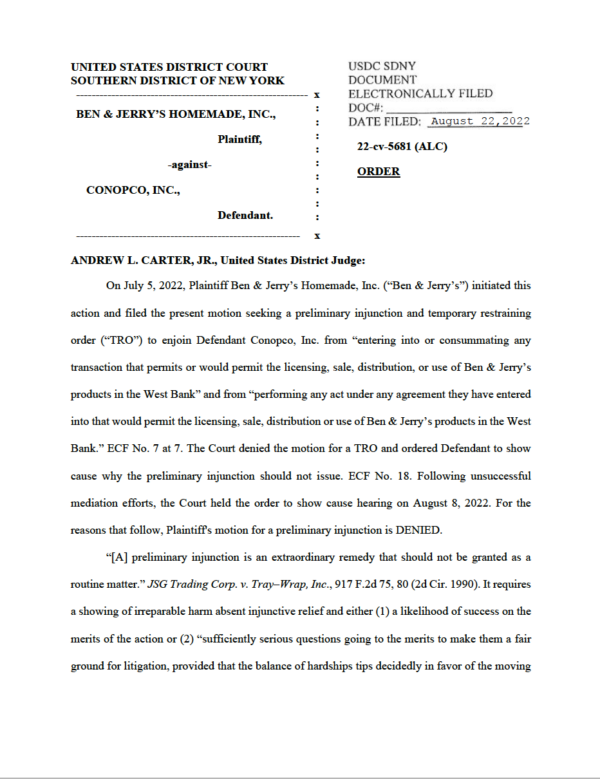 Ben-and-Jerry-Order-8-22-22 Court order denying Ben & Jerry’s request for an injunction against Unilever. Court order denying Ben & Jerry’s request for an injunction against Unilever. [Click on image to see document.] |
|
Ben & Jerry’s Antisemitic board denounces Proud Israeli Jews
|
|
A defeat for Ben & Jerry’s, and all of BDSThe victory over the ice cream company’s efforts to cease sales in Judea and Samaria would not have been possible without continuous efforts to spread the truth: that boycotting Israel is antisemitic, and as such, is intolerable and unacceptable.By Ariel Bulshtein Published on 08-24-2022 11:53 Last modified: 08-24-2022 11:59 Ben & Jerry’s resounding failure in trying to prevent the sale of its ice-cream in Judea and Samaria – a move first rejected by its parent company Unilever and now by a US court – is bound to have more far-reaching consequences than Israeli consumers’ ability to continue to enjoy the product.
Israel’s victory over the attempted boycott proves that insisting on our rights and uncompromisingly adhering to our principles pays off.
For years, we were used to efforts aimed at delegitimizing us. First, it was the Arab boycott, which expanded to other countries and companies that should have stood by Israel because they had no connection to the Arabs who tried to wipe the young Jewish state off the map. Their secondary boycott was particularly cynical: these nations and conglomerates simply surrendered to the forceful violence of those who seek to harm us, compromising their principles for nothing.
No wonder that those boycotting Israel were never satisfied with inflicting economic damage alone. They \wanted to isolate the Jewish state too, and strip it of its legitimacy through boycotting it in every arena, from international organizations to culture and sports.
Even when the Arab boycott stronghold was breached in the 1990s, the tools continued to be used by our enemies – now by left-wing organizations and Western countries – which were enthusiastic about embracing the anti-Zionist vision and isolating Israel with fervor that would have put the Nazi campaigns to shame.
For the Left, the outline was clear: to bring an anti-Israel atmosphere into every sphere of life, to ostracize the Jewish state and prepare the ground for the expansion of sanctions against it, all the way to government and international institutions.
Israel was targeted from all directions, and yet, it did nothing. The peak of the wave occurred around the turn of the century, which is no coincidence. The Oslo Accords and the disengagement policies only reinforced the boycott movement. A little bit more effort, the activists believed, and Israel will break.
And they spared no effort: Israeli scientists were excluded from international conferences and projects, international companies cut ties with Israeli tenders, and talks of boycotting corporations and banks that dared invest in Israel became common knowledge.
The trend began to change when Israel and its allies – Jewish communities in the Diaspora, first and foremost – stopped turning the other cheek and began to retaliate against our enemies.
We are beginning to see the fruits of their efforts with the Ben & Jerry affair, a victory that would have been impossible without continuous efforts to spread the truth: that boycotting Israel is antisemitic, and as such, is intolerable and unacceptable.
And yet, the fight is not over. There are still battles against the boycott movement to be fought, but the ice cream precedent is sweeter than ever. Our bravery brought us a victory. |
|
Stopping BDS Cold: Five Lessons to Be Learned From Ben & Jerry’s Attempt to Cream IsraelStory updated on August 23, 2022: The attempt by ice-cream maker Ben & Jerry’s to stop sales of its products in Judea and Samaria was rejected on August 23 by a federal judge. US District Court…Gil Hoffman July 4, 2022 https://honestreporting.com/stopping-bds-cold-five-lessons-to-be-learned-from-ben-jerrys-attempt-to-cream-israel/ Story updated on August 23, 2022: The attempt by ice-cream maker Ben & Jerry’s to stop sales of its products in Judea and Samaria was rejected on August 23 by a federal judge.
US District Court Judge Andrew Carter in Manhattan said that Ben & Jerry’s did not deserve an injunction to halt ice cream sales because it did not show that it would suffer irreparable harm, or that customers would be confused.
In the lawsuit, the Ben & Jerry’s board argued that the transfer breached a deal between them and Unilever because it circumvented the ice cream company’s decision to end sales in what it considers “occupied Palestinian territory.”
The agreement enabling Ben & Jerry’s ice cream to continue to be sold throughout Israel announced on June 29 was a sweet victory against the BDS movement.
This was a resounding win against the worldwide BDS movement, many of whose advocates openly support the destruction of the Jewish state. The agreement enabling Ben & Jerry’s ice cream was also a personal victory for the 160 people employed at the Negev factory who had been worrying about their jobs since the decision last July by Ben & Jerry’s to end its contract with its Israeli licensee Avi Zinger over his refusal to stop selling its ice cream over Israel’s pre-1967 border.
But parent company Unilever’s announcement last Wednesday that it had sold its Ben & Jerry’s ice cream business in Israel to Zinger has much farther reaching ramifications than their jobs or the packaging now being labeled in Hebrew and not English.
Not only did Unilever’s move prove that BDS can be defeated — it provided a new working model that can be employed in the future. Takeaway #1: Gain the Moral High GroundBen & Jerry’s cited the company’s liberal values when it decided to break the 34-year agreement with its Israeli licensee because he would not stop selling ice cream in what the company termed “Occupied Palestinian Territory.”
But it quickly became apparent that the board of Ben & Jerry’s did not want its ice cream sold anywhere in the Jewish state, due to the extreme political views of the board members. Anuradha Mittal, the chair of Ben & Jerry’s board of directors, endorsed BDS on social media, posted an article defending Hezbollah and was accused in a watchdog complaint to the Internal Revenue Service of funneling tens of thousands of dollars from the company to her pro-Palestinian organization.
Related Reading: Ben & Jerry’s ‘Settlements’ Boycott: NYT, WaPo Cover Up Eliminationist Goal of BDS, Giving Free Pass to Orgs That Support It Company founders Ben Cohen and Jerry Greenfield were offended by accusations of antisemitism. But when interviewed, they could not answer why the company had not stopped or conditioned sales in places like Georgia that also have policies they oppose.
Singling out the one Jewish state is part of the IHRA definition of antisemitism that has been adopted or endorsed by 865 entities worldwide, including 37 countries, and the US Departments of Education and State.
By contrast, whenever Zinger spoke, he was apolitical. He mentioned peace and coexistence and his opposition to discrimination.
“This is a significant victory for us and for all who believe in cooperation and coexistence, and it is a resounding defeat for those who call for discrimination and boycotts,” Zinger said in his June 29 victory tweet.
Takeaway #2: BDS Must Be Fought Both Publicly and Behind the ScenesAs part of the public relations battle, Zinger invited the press to visit the factory and speak to workers, including Muslim and Christian Arabs, Bedouin and Israeli Jews from across the political and religious spectrum. An Ethiopian immigrant with nine children who was afraid of losing his livelihood made a particularly strong impression on the international media.
In addition, Foreign Minister Yair Lapid, who is now Israel’s prime minister, spoke to governors whose states passed anti-BDS laws and urged them to take immediate action. Seven US states either restricted or sold Unilever stocks or bonds to protest Ben & Jerry’s decision, removing hundreds of millions in pension funds from Unilever.
Related Reading: Major Media Outlets Mute as US States Divest from Unilever Over Ben & Jerry’s Israel Boycott Then-prime minister Naftali Bennett spoke to Unilever CEO Alan Jope. Meanwhile, the Knesset started working on implementing anti-boycott regulations against companies that were targeting Israel, and would have damaged Unilever’s massive investments in several Israeli companies that have nothing to do with ice cream had they succeeded.
But most of the work was done behind the scenes, painstakingly, by top Foreign Ministry officials. Foreign Ministry legal adviser Tal Becker and deputy director-general for public diplomacy Noam Katz worked tirelessly for several months to help find an amicable solution.
“The lesson is that quiet, smart diplomacy can be very effective,” a source close to Lapid told HonestReporting. Takeaway #3: Partnerships Are Required to Defeat BDSZinger could not have fought Unilever and Ben & Jerry’s by himself. He takes pride in being a simple businessman who likes ice cream and hates politics.
“I don’t want to be a model, and I’m not interested in politics or politicians,” he told HonestReporting. “I just want to make ice cream and help my workers.”
So Zinger built a team of lawyers led by Alyza Lewin, the president of the Louis D. Brandeis Center for Human Rights Under Law, which sued Unilever in the US District Court of New Jersey, where Unilever US is headquartered.
Related Reading: Ben & Jerry’s Boycott Violates US Law, HonestReporting Takes Legal Action The fight to keep Ben & Jerry’s throughout Israel was a partnership of Zinger, his lawyers, the Foreign Ministry and organizations like HonestReporting that campaigned for the justice of the cause.
Private business, government, legal authorities and public diplomacy organizations working together will be integral parts of all future efforts to fight BDS effectively. Takeaway #4: Aim HighThere was no point in fighting Ben & Jerry’s Vermont, which has a long history of supporting fringe political causes. Part of successful public diplomacy is knowing when to not make a wasted effort.
Unilever, by contrast, is an international corporation that could not afford to be tainted by charges of antisemitism. One official who worked for Zinger said the strategy was to “wear out Unilever” with the public campaign.
Related Reading: With A Little Help From Like-Minded Friends: Who Ben & Jerry’s Consulted With Before Making Israel Boycott Decision The corporation could and should have acted against the Vermont decision from day one. But the end result of it taking so long was ultimately much better, because after being put on the defensive, Unilever’s announcement went well past Ben & Jerry’s.
“Unilever rejects completely and repudiates unequivocally any form of discrimination or intolerance,” the company said, adding: “Antisemitism has no place in any society. We have never expressed any support for the Boycott Divestment Sanctions (BDS) movement and have no intention of changing that position.”
Those who question whether BDS is antisemitism no longer have to quote an Israel advocate saying it. Here Unilever says it loudly and clearly.
Unilever boasted that it has invested more than one billion shekels in its business in Israel and said the company “looks forward to continuing to make a positive contribution to Israel’s economy and society for many decades to come.” Takeaway #5: Create a Win-Win Situation for Everyone…including the LoserZinger can now distribute ice cream in Israel forever. He can now also sell products with Arabic-language labels for the first time, and as part of the agreement, he will be given rights to sell any new flavors launched by Ben & Jerry’s in Vermont.
As such, his lawyers, Lapid and Israeli consumers emerged victorious.
But what about Ben & Jerry’s in Vermont? They won, too, because they can now claim that they will no longer profit from selling ice cream in what they see as occupied land.
“We continue to believe it is inconsistent with Ben & Jerry’s values for our ice cream to be sold in the Occupied Palestinian Territory,” a Ben & Jerry’s representative posted on Twitter.
The biggest winner, however, is Israel, which has gained a new deterrence mechanism in the fight against BDS — thanks to the Ben & Jerry’s victory that set a precedent that could prevent future battles from even taking place.
Or, as a Foreign Ministry official told HonestReporting: “This is definitely a resounding public punch with a strong message to every large international corporation.” |
|
Buy locally and save.A Yeshiva in Jerusalem, Men are studying. |
|
| Buy locally and save. You may find a equivalent product locally at a cheaper price and with less stress and worry if something goes wrong. Remember to include the cost of Shipping, Insurance, Customs, and the cost of shipping the product back if something goes wrong. Also it may take a month to get your product from America. It may have to be examined by customs, both here and in the States. | |
This is what it means to be “Pushed into the Sea”. |
|
Six Day War – Israeli victory – Documentary – War of Redemption15 Seconds in Sderot, Israel |
|

You’re focused on the wrong thingIsrael will grow and thrive with, or without, Chubby Hubby. What Israel does need, however, are the good Jews around the world who – until this week – ate Cookie Dough and Cherry Garcia. Op-ed.Shmuel Sackett, 25July2021 https://www.israelnationalnews.com/News/News.aspx/310496  Nefesh B’Nefesh: Live the Dream US & CAN 1-866-4-ALIYAH | UK 020-8150-6690 or 0800-085-2105 | Israel 02-659-5800 https://www.nbn.org.il/ info@nbn.org.il This past week, I read more articles and heard more jokes about Ben & Jerry’s than I have in the last 100 years… ok, only the last 59 years. While everyone meant well, including the “We Stand with Israel” attitude, I have to be straight and honest with you… you’re focused on the wrong thing! The problem is not that Ben & Jerry’s ice-cream is sold in Jewish neighborhoods in NY or Chicago. The problem… is that there are Jewish neighborhoods in NY and Chicago! Sorry to break the bad news to you but this has nothing to do with ice-cream! The problem is much larger than Ben and Jerry… it includes Chaim, Moishe Dovid, Rivke, Sarale, Shira… That’s right, you are blaming the ice-cream, when it’s the people buying it up to now in the USA who need the wake-up call.
Personally, I don’t care what Ben or Jerry say. They are entitled to their opinion and if their warped minds drive them to the conclusion that they shouldn’t sell Chunky Monkey in Israel, then they shouldn’t sell it in Israel! You think we need that here? I assure you that Israel will grow and thrive with, or without, Chubby Hubby. What Israel does need, however, are the good Jews around the world who – until this week – ate Cookie Dough and Cherry Garcia. Yes, you… I’m talking to you!!!
No, dearest friends, it’s not enough to just kick both Ben and Jerry out of your homes and stores. You need to kick yourselves out of your foreign countries as well! All these signs that have been posted by stores proudly displaying that they “We Stand with Israel” need to be changed to “We Stand in Israel” because that is what the Jewish nation needs more than anything else.
This twisted attitude reminded me of the difficult time in Israel during the knife attacks. It started on Sukkot, a few years ago, when an innocent Jew was stabbed – almost daily – as he/she was shopping or simply standing at a bus stop. Remember the holy Ari Fuld? He was one of those victims, may HaShem avenge his blood. After one of those horrific stabbings inside a Rami Levy supermarket, by an Arab employee, the owner – Rami Levy himself, announced that all knives would immediately be removed from the shelves. Wow! What a bold move… no more knives will be sold in Rami Levy!! There’s only one small problem… 80% of Rami Levy employees are Arabs and – last I checked – it wasn’t the knife that did the stabbing…
Throwing out the knives is similar to throwing out the ice-cream. The intention is good, but the action is meaningless. Let’s be honest; keeping the Arabs but throwing out the knives won’t save Jewish lives and keeping the Jews in America while throwing out the ice-cream won’t accomplish much either.
Therefore, here’s what really needs to be done. Call Nefesh b’Nefesh and get your Aliyah moving along. Then, at the big “Going Home to Israel Party”, serve Ben & Jerry’s to all your guests. Get the Caramel Chocolate Cheesecake (my personal favorite) and take as many selfies as possible. Send them to both Jerry & Ben with the line; “Thanks to you, we are moving to Israel with a sweet taste in our mouth!” Then get on the plane and never look back.
Shmuel Sackett is the Founder and Director of the Am Yisrael Chai Fund, which supports agricultural, educational and building projects across Eretz Yisrael. |
|
Ben and Jerry’s Israel-All Kashrut Cholov Yisroel NO Kitniyot-Pesach Ice Cream
|
|

New Ben & Jerry’s Limited-Edition Flavor for Lag B’Omer in IsraelBy Hana Levi Julian
Israeli ice cream lovers, rejoice! Ben & Jerry’s Israel has announced it will offer a brand-new flavor – in a limited edition – for the upcoming Lag B’Omer holiday. The new flavor, “S’mores” will reprise the long-beloved sweet, created annually by countless children at summer campfires, using sweet crackers, chocolate bars and gooey, roasted marshmallows. The name “s’mores” is an abbreviation of the phrase “some more.” The Ben & Jerry’s version – only in Israel and only for the Lag B’Omer holiday, will feature ice cream that combines marshmallow with cookie crumbs, chocolate cookie crumbs and pieces of fudge. The new flavor will be available in all the Israeli food chains, convenience stores and supermarkets where Ben & Jerry’s is sold. |
|

Unilever Dropping Anti-Israel Company Ben & Jerry’s as It Exits the Ice Cream BusinessThe company caused many problems for Unilever over its hatred of Israel, embracing of antisemites, participation in the BDS movement, and anti-America tweets.Posted by Mary Chastain
Unilever, which owns over 400 companies, has finally decided to kick Vermont-based Ben & Jerry’s to the curb.
Unilever claims it wants “to accelerate its Growth Action Plan (GAP) through the separation of Ice Cream and the launch of a major productivity programme.” From the press release:
Unilever also owns Cornetto, Magnum, and Kwality Wall’s.
But dropping Ben & Jerry’s relieves Unilever of many troubles caused by the rabid anti-Israel company that enthusiastically joined the BDS movement.
Unilever bought Ben & Jerry’s in 2000. The company maintained an independent board of directors to continue its far-left political advocacy.
In 2018, Ben & Jerry’s embraced antisemite Linda Sarsour to promote its “Resist” ice cream. The money from the ice cream supported pro-Farrakhan Women’s March and other anti-Trump groups.
In 2021, Ben & Jerry’s chose to boycott the “Occupied Palestinian Territory,” including the ancient Jewish quarter of Jerusalem.
The boycott led to a year filled with lawsuits for Unilever.
A handful of states divested from Unilever over Ben & Jerry’s BDS actions.
Those states include Illinois, New Jersey, North Carolina, Colorado, Florida, and Arizona.
Even more states passed laws preventing them from investing with companies involved in the BDS movement. Illinois started things off in 2015.
Ben & Jerry’s head got too big, though. On Independence Day, the company tweeted, “This 4th of July, it’s high time we recognize that the US exists on stolen Indigenous land and commit to returning it.”
That tweet ticked off many people, including Native Americans. One leader of a tribe recognized in Vermont had a response:
Ben & Jerry’s also lost $2.5 billion after the tweet, which resulted in many boycotts of the company.
|
|

